Sunglass
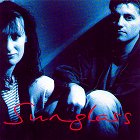 A very strange album, this, but it has a kind of hypnotic appeal to me. Most of the numbers are very slow, acoustic, and at best are mesmerising. The “group” consists of Simon Honisett and Penny Hewson, with occasional guest players, and the production values are low-tech, maybe barely a step above the Finn Brothers’ debut album (you can’t hear most of the tape hiss), but the sameness of most of the songs may lose Sunglass some points with some listeners. On the good side, the lyrics are often interesting, and there are
A very strange album, this, but it has a kind of hypnotic appeal to me. Most of the numbers are very slow, acoustic, and at best are mesmerising. The “group” consists of Simon Honisett and Penny Hewson, with occasional guest players, and the production values are low-tech, maybe barely a step above the Finn Brothers’ debut album (you can’t hear most of the tape hiss), but the sameness of most of the songs may lose Sunglass some points with some listeners. On the good side, the lyrics are often interesting, and there are  some interesting vocals – Penny Hewson sometimes comes across sounding a little like Julee Cruise.
some interesting vocals – Penny Hewson sometimes comes across sounding a little like Julee Cruise.
- Most Days (4:18)
- The Saddest Girl in the World (2:47)
- The Biggest Mess (4:19)
- Dust (2:15)
- Before The Light (4:37)
- Hollowhead (2:37)
- Here We Go Again (2:56)
- When Stars Collide (2:17)
- You and Me (2:05)
- For Real (4:33)
- Sugar Sweet Goodbye (2:48)
- I Want To Be There (7:10)
- Bringing Someone Back (5:48)
- Remember These (4:41)
Released by: Choc Chip Records
Release date: 1994
Total running time: 48:37
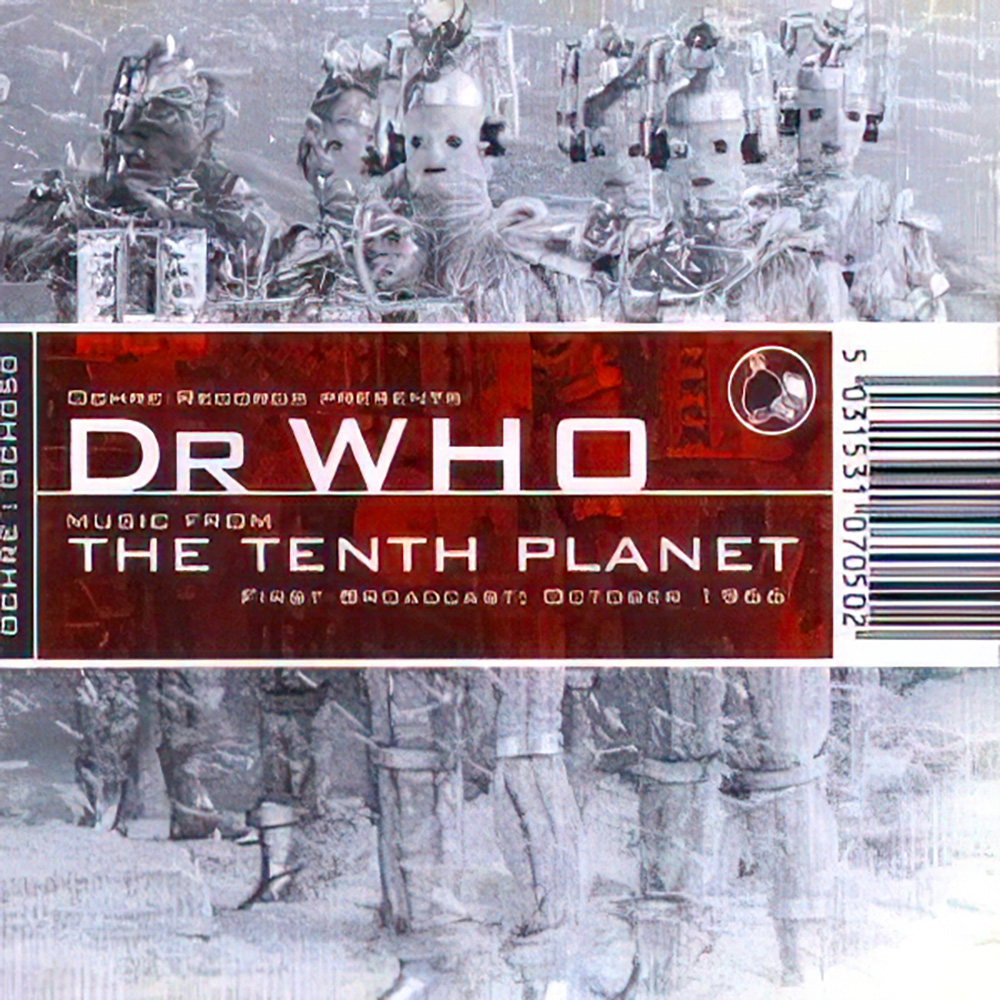
Doctor Who: The Tenth Planet
 Though a bit pricey, this is a nice compilation of the early 60s stock library music used to track the pivotal Doctor Who four-parter, The Tenth Planet. And the timing is no accident – this CD hit the shelves in Great Britain hot on the heels of the much-anticipated video release of the same name.
Though a bit pricey, this is a nice compilation of the early 60s stock library music used to track the pivotal Doctor Who four-parter, The Tenth Planet. And the timing is no accident – this CD hit the shelves in Great Britain hot on the heels of the much-anticipated video release of the same name.
My biggest complaint about Tenth Planet is its length-to-cost ratio. Not even twenty minutes long, the CD costs just over ten pounds (roughly equivalent to $15 US). The real incentive in this CD is the rarity of the material. This music has previously been released on such past barely-legit CD releases as Music From Tomb Of The Cybermen and Space Adventures, both of which, like this one, were limited releases, and now sell for ridiculous amounts on online auction sites.
The remastering on these library tracks is fairly good, bearing in mind that the oldest of this material is four decades old, several years older than the show in which they were re-used! Space Adventures parts 1 and 2 were used not only as the “theme” for the Cybermen during their reign of terror in the 60s, but was also the stock music used in many a moment of danger for the Doctor and friends during that era (including, among others, The Web Of Fear). It’s sort of like the fight music from Star Trek’s Amok Time episode – it was used for everything in those episodes where original music was not commissioned. There’s also a certain Carl Stalling-ish quality to this material as well.
 I’d advise you to get your hands on this one before it becomes the next Space Adventures – in other words, before it becomes high-priced eBay bait. The music may not be to everyone’s taste, but this may be the last chance Doctor Who music completists have to get a hold of it. After years of seeing Space Adventures sell for huge amounts of money, I was happy to pay only $15 to get this.
I’d advise you to get your hands on this one before it becomes the next Space Adventures – in other words, before it becomes high-priced eBay bait. The music may not be to everyone’s taste, but this may be the last chance Doctor Who music completists have to get a hold of it. After years of seeing Space Adventures sell for huge amounts of money, I was happy to pay only $15 to get this.
- Blast Off! by Roger Roger (2:24)
- Music For Technology by Walter Stott (1:35)
- Power Drill by Douglas Gamley (1:15)
- Space Adventure Part 1 by Martin Slavin (0:41)
- Space Adventure Part 2 by Martin Slavin (1:25)
- Space Adventure Part 3 by Martin Slavin (0:17)
- Drama In Miniature Part 1 by Dennis Farnon (1:31)
- Drama In Miniature Part 2 by Dennis Farnon (1:10)
- Machine Room by Douglas Gamley (3:02)
- Drumdramatics 7 by Robert Farnon (2:33)
- Drumdramatics 10 by Robert Farnon (3:08)
Released by: Ochre Records
Release date: 2000
Total running time: 19:01
Man…Or Astroman? – EEVIAC
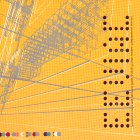 This incongruously titled new collection from Man…Or Astroman? is also an incongruous entry in the band’s surf-rock-on-acid catalogue, but it’s not bad. Imagine, if you will, Dick Dale having a head-on collision with the Art of Noise. That’s kind of what this sounds like. Samples and electronic percussion work their way into the MOAM mix for the first time, and the result is very strange but still listenable. The theme seems to be a retro vision of the future, when everyone expected the world to be run by huge, room-filling
This incongruously titled new collection from Man…Or Astroman? is also an incongruous entry in the band’s surf-rock-on-acid catalogue, but it’s not bad. Imagine, if you will, Dick Dale having a head-on collision with the Art of Noise. That’s kind of what this sounds like. Samples and electronic percussion work their way into the MOAM mix for the first time, and the result is very strange but still listenable. The theme seems to be a retro vision of the future, when everyone expected the world to be run by huge, room-filling  computers with open reels of magnetic tape whirring constantly. Some MOAM purists may be offended by the techno leanings of EEVIAC, but I was amused by them – and relieved that the band has found, even if only for one album, a bizarre way to keep their sound fresh.
computers with open reels of magnetic tape whirring constantly. Some MOAM purists may be offended by the techno leanings of EEVIAC, but I was amused by them – and relieved that the band has found, even if only for one album, a bizarre way to keep their sound fresh.
- Interstellar Hardrive (2:17)
- D:contamination (2:20)
- U-235 / PU-239 (2:02)
- Domain of the Human Race (1:33)
- Theme from EEVIAC (2:33)
- A Reversal of Polarity (3:32)
- Fractionalized Reception of a Scrambled Transmission (1:18)
- Engines of Difference (2:42)
- Psychology of A.I. (numbers follow answers) (1:33)
- Krasnoyask-26 (1:14)
- Within the Mainframe, Impaired Vision from Inoperable Cataracts Can
Become a New Impending Nepotism (2:54)- As Estrelas Agora Elas Estao Mortas (2:53)
- _____ / Myopia (6:26)
Released by: Touch And Go
Release date: 1999
Total running time: 36:53
Electric Light Orchestra – Flashback
 And to think, you thought ELO’s story was over. A series of rare tracks, live cuts, concerts and rarities have kept the band alive for fans during the 90s – not to mention a little band called ELO Part Two, who have been paying Jeff Lynne’s mortgage from publishing royalties alone for the past decade. But with the abrupt end of ELO Part Two, now operating under the somewhat generic name Orchestra, we should’ve known something was up. Jeff Lynne’s been a busy boy, supervising the restoration and remastering of the original ELO session tapes and finishing incomplete recordings which originated anywhere from 1980 to ’82. Alternate mixes of “Do Ya”, “Mission (A World Record)” and “Mama” are included here, along with a murky 1973 home demo and a completely new version of “Xanadu”, performed by Lynne in a style which seems to owe more to the Traveling Wilburys than to ELO.
And to think, you thought ELO’s story was over. A series of rare tracks, live cuts, concerts and rarities have kept the band alive for fans during the 90s – not to mention a little band called ELO Part Two, who have been paying Jeff Lynne’s mortgage from publishing royalties alone for the past decade. But with the abrupt end of ELO Part Two, now operating under the somewhat generic name Orchestra, we should’ve known something was up. Jeff Lynne’s been a busy boy, supervising the restoration and remastering of the original ELO session tapes and finishing incomplete recordings which originated anywhere from 1980 to ’82. Alternate mixes of “Do Ya”, “Mission (A World Record)” and “Mama” are included here, along with a murky 1973 home demo and a completely new version of “Xanadu”, performed by Lynne in a style which seems to owe more to the Traveling Wilburys than to ELO.
There are many familiar and somewhat more obscure tracks in this box set, and the remastering that has been performed on that material is quite a revelation. For the first time, “Shangri-La” and “Livin’ Thing” aren’t pureèd by the noise reduction technology of the 70s – the latter in particular has had a very annoying overmodulation effect in the build-up to the last chorus since I first heard it, so it’s nice to hear it the way it was originally performed for the first time.
New bits are heard here and there as well, such as an interesting synth instrumental right before “Hold On Tight”, some Beatlesque echo-drenched count-ins, and so on.
The edits and alternate mixes of classic songs are interesting from a completist point of view; personally, unlike Jeff Lynne in his liner notes, I have never felt that 1972’s “Mama” was an overly long number, and to say that I preferred the original mix of “Mission (A World Record)” as released in 1976 would be an understatement. This new mix is an interesting way to study the song’s densely layered arrangements, as it lacks many of the backing vocals of the original, but that’s all. And I can’t tell if “Do Ya” is a grand rebirth for one of ELO’s oldest songs (it was originally a Move number), a product of extensive computerized editing, or both.
The real gems, however, are the half-dozen or so outtakes and previously uncompleted songs from the early 1980s. “Grieg’s Piano Concerto In A Minor” is just what it says it is, given a groovy Ventures-style surf-rock arrangement which has to be heard to be believed (!). “Tears In Your Life” is a somber reject from 1982’s Secret Messages album, which Lynne completed with a new three-part harmony vocal (the original intent was for the entire song to be sung through a vocoder), and sports some elegant middle-eastern-influenced string work. Other leftovers from the Secret Messages sessions are the incredibly silly “Who’s That?” (a Monty-Python-esque bit of messing around with fart sounds that was probably never intended to appear in any officially-released form) and “Helpless”, which has some amazing vocal harmonies hearkening back to ELO’s glory days.
But in my view, the real treat is “Love Changes All”, a never-before-heard number from the 1980 sessions for ELO’s half of the Xanadu soundtrack. Not only are the pre-requisite swirling string arrangements there, but so is a large choir and some of Lynne’s best vocals (and lyrics). It’s a shame the song was never finished until this year.
The box art is a fantastic revisitation of some of the concepts from 1977’s Out Of The Blue cover art, which forever solidified the ELO/spaceship/science fiction connection that furthered the group’s reputation as a cult-following-only band, right up there with most other well-loved science fiction icons. The booklet contained in the box is an almost fawning tribute to Lynne’s genius. I love Jeff Lynne’s songwriting and production style, but these things should not be stressed at the expense of such pivotal past members as Bev Bevan, Kelly Groucutt (who sued his ex-bandmates in the 1980s over whether he was a full member of the band entitled to royalties, or just a high-paid session musician who just happened to play on virtually every song the group recorded between 1975 and 1983), and co-founder Roy Wood.
 With its steep price tag, I’m not sure that Flashback will spark the ELO renaissance that Epic is hoping for – and with the announcement of Zoom, a completely new ELO album created by Jeff Lynne for a 2001 release, I’m sure there was some hope that Flashback would generate some real interest. Die-hard ELO fans like myself are sure to pick it up for the new material, but will the general music-buying community catch on fire for this? Only time will tell.
With its steep price tag, I’m not sure that Flashback will spark the ELO renaissance that Epic is hoping for – and with the announcement of Zoom, a completely new ELO album created by Jeff Lynne for a 2001 release, I’m sure there was some hope that Flashback would generate some real interest. Die-hard ELO fans like myself are sure to pick it up for the new material, but will the general music-buying community catch on fire for this? Only time will tell.
Disc one
- 10538 Overture (5:31)
- Showdown (4:12)
- Ma-Ma-Ma Belle (3:54)
- Mr. Radio (5:03)
- Roll Over Beethoven (7:48)
- Mama – new edit (6:05)
- One Summer Dream (5:21)
- Illusions In G Major (2:41)
- Strange Magic (4:29)
- Eldorado Overture (2:12)
- Can’t Get It Out Of My Head (4:24)
- Eldorado (5:18)
- Eldorado Finale (1:29)
- Do Ya – alternative mix (4:09)
- Mister Kingdom (5:08)
- Grieg’s Piano Concerto In A Minor (2:59)
Disc two
- Tightrope (5:23)
- Evil Woman (4:19)
- Livin’ Thing (3:34)
- Mr. Blue Sky (5:07)
- Mission (A World Record) – alternative mix (4:31)
- Turn To Stone (3:48)
- Telephone Line (4:45)
- Rockaria! (3:15)
- Starlight (4:45)
- It’s Over (3:55)
- The Whale (5:06)
- Sweet Talkin’ Woman (3:49)
- Big Wheels (5:32)
- Shangri-La (5:36)
- Nightrider (4:24)
- Tears In Your Life (3:06)
Disc three
- Don’t Bring Me Down (4:04)
- The Diary Of Horace Wimp (4:17)
- Twilight (3:42)
- Secret Messages (4:38)
- Take Me On And On (4:58)
- Shine A Little Love (4:11)
- Rock And Roll Is King (3:15)
- Last Train To London (4:31)
- Confusion (3:40)
- Getting To The Point (4:51)
- Hold On Tight (3:08)
- So Serious (2:43)
- Calling America (3:27)
- Four Little Diamonds (4:06)
- Great Balls Of Fire – live, 1974 (3:06)
- Xanadu – new version (3:21)
- Indian Queen – demo (0:57)
- Love Changes All (3:28)
- After All (2:24)
- Helpless (3:19)
- Who’s That? (1:26)
Released by: Epic/Legacy
Release date: 2000
Disc one total running time: 68:52
Disc two total running time: 71:01
Disc three total running time: 73:42
Depeche Mode – Violator
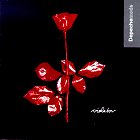 Hailed as a change in direction in the group’s sound, this 1990 album from Depeche Mode introduced one new element: guitars, or at least better-than-usual samples thereof, in addition to the usual wall of synths and samples. But aside from what instruments were being used, this was a big shift in another way, one that I liked – an emphasis on melody and decent songwriting rather than production techniques and pushing the limits of synths and samples for their own sake. There’s actually decent music on here.
Hailed as a change in direction in the group’s sound, this 1990 album from Depeche Mode introduced one new element: guitars, or at least better-than-usual samples thereof, in addition to the usual wall of synths and samples. But aside from what instruments were being used, this was a big shift in another way, one that I liked – an emphasis on melody and decent songwriting rather than production techniques and pushing the limits of synths and samples for their own sake. There’s actually decent music on here.
Highlights include the slinky “Sweetest Perfection” and low-key “Waiting For The Night”, along with the hit singles “Personal Jesus” and “Enjoy The Silence” (which were followed up by a somewhat smaller hit, “Policy Of Truth”). “Blue Dress” hails back to the lighter, more melodic Depeche Mode of the early 80s, in sound if not in subject matter, and features some of David Gahan’s best vocals in years. Across the board, the vocals on Violator are better than on any Depeche Mode album since Black Celebration.
Martin Gore’s guitar work stands out enough to let us know we’ve been missing out on a decent guitarist ever since Depeche Mode went all-synth.
Also, there are some untitled instrumental interludes hiding after a few of the other tracks, including a  haunting piece called “Crucify”, which lurks at the end of the “Enjoy The Silence” track.
haunting piece called “Crucify”, which lurks at the end of the “Enjoy The Silence” track.
And finally, the album’s last track, “Clean”, truly becomes an exercise in irony in hindsight, when one considers that lead singer Gahan later went on to attempt suicide and enter drug rehab. (Then again, Gahan didn’t write the song – Martin Gore did.)
- World In My Eyes (4:26)
- Sweetest Perfection (4:44)
- Personal Jesus (4:56)
- Halo (4:30)
- Waiting For The Night (6:07)
- Enjoy The Silence (6:13)
- Policy Of Truth (4:55)
- Blue Dress (5:42)
- Clean (5:28)
Released by: Reprise
Release date: 1990
Total running time: 46:58
Toto – Past To Present
 So, whatever happened to the band that did “Africa”? Well, if you listen to the “new” tracks recorded by Toto for their best-of CD, you’ll probably answer, “Not nearly enough.”
So, whatever happened to the band that did “Africa”? Well, if you listen to the “new” tracks recorded by Toto for their best-of CD, you’ll probably answer, “Not nearly enough.”
Oh, don’t get me wrong. I used to like Toto’s stuff quite a bit. One can hardly go through a catalog of memorable songs from the 1980s without bringing up “Africa” and “Rosanna”, and “Hold The Line” is still a pleasantly non-guilty memory of late 70s rock for many. (“Georgy Porgy”, on the other hand, is still pretty much a guilty pleasure for those who actually like it. It’s not one of my favorites.) Toto’s right up there with Foreigner in my mind in the “good while it lasted” category.
And right up there with Chicago, too, for Toto has really slipped from its former glory. New vocalist – well, new as of ten years ago, and I haven’t heard a thing out of the band since – Jean-Michel Byron strips Toto of its edge, giving the group’s sound that glossed-over veneer of a one-great rock band that has descended into pre-fabricated, synth-heavy soft-rock schlock. The four new tracks on Past To Present hardly sound like Toto. Even when the old Toto lineup did ballads, such as the palatable “I’ll Be Over You” from their Fahrenheit album, the songs were sung by someone who still clearly had the pipes to do some larynx-ripping rock vocals. Not so here – Toto becomes as rockin’ as Chicago during the Peter Cetera epoch…which is to say, not rockin’ at all.
But those are only four songs. The rest of this album’s material is the classic stuff that put Toto on the map to begin with. The understated percussive textures and vocal harmonies of “Africa” stand up to anything on the charts today, the bluesy rock of “Rosanna” and “Hold The Line” have stood the test of time quite well, and my own guilty pleasure – 1988’s “Pamela” (which is admittedly a ripoff of the group’s own “Rosanna”) – still sounds  good to my ears. I liked Toto’s rock numbers better than their ballads, but even “I’ll Be Over You”, “99” and “I Won’t Hold You Back” are easier on the ears than the four tracks of neo-Toto.
good to my ears. I liked Toto’s rock numbers better than their ballads, but even “I’ll Be Over You”, “99” and “I Won’t Hold You Back” are easier on the ears than the four tracks of neo-Toto.
Recommended for casual Toto fans – just remember to skip the new stuff.
- Love Has The Power (6:32)
- Africa (4:59)
- Hold The Line (3:57)
- Out Of Love (5:55)
- Georgy Porgy (4:08)
- I’ll Be Over You (3:50)
- Can You Hear What I’m Saying (4:47)
- Rosanna (5:35)
- I Won’t Hold You Back (4:59)
- Stop Loving You (4:29)
- 99 (5:12)
- Pamela (5:12)
- Animal (5:02)
Released by: Columbia
Release date: 1990
Total running time: 64:32
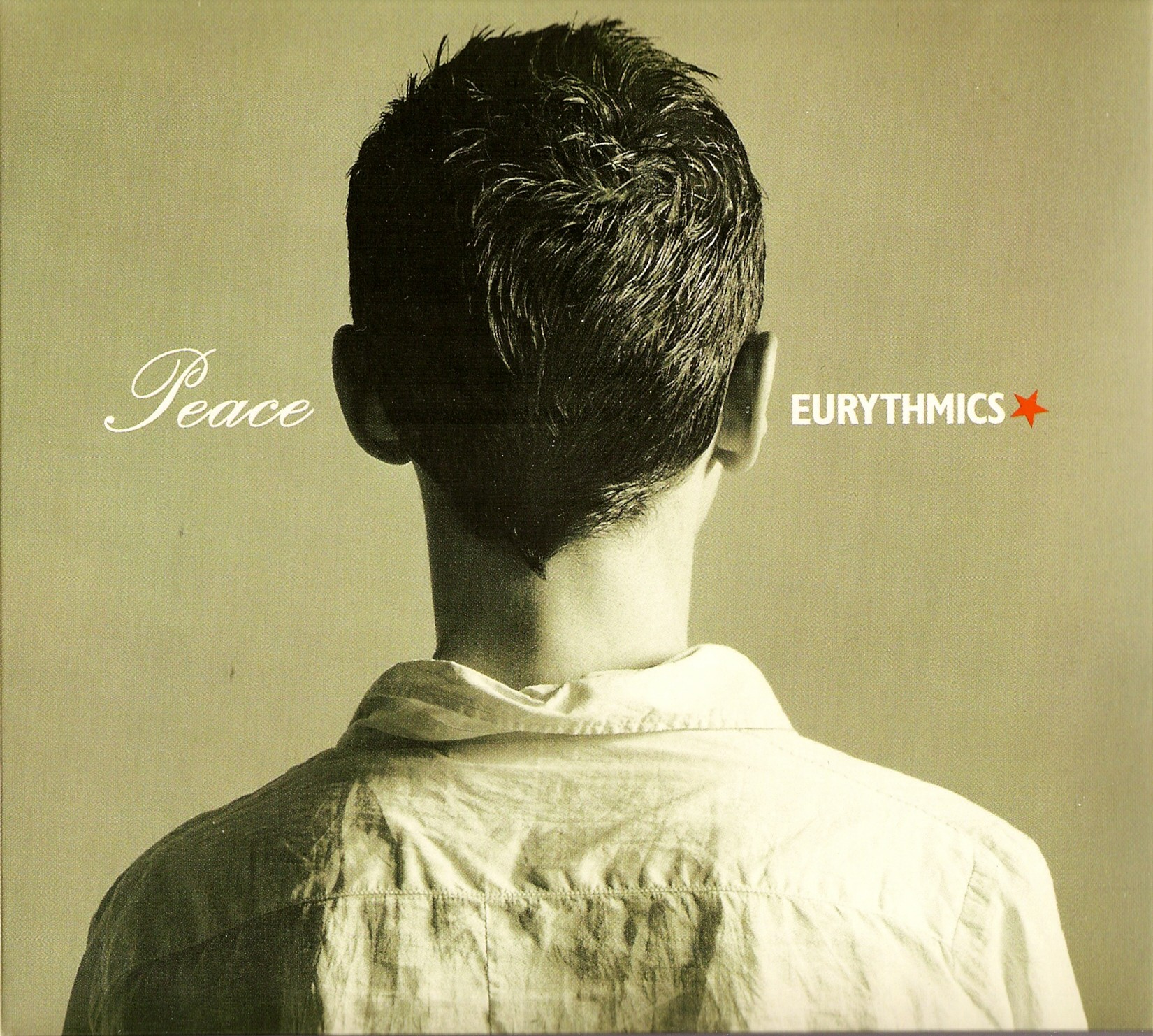
Eurythmics – Peace
Like a lot of groups – Man Or Astroman?, the Moody Blues and others – the Eurythmics suddenly reunited in 1999, as if the year 2000 signaled the end of everything (or at least the end of the line for any veteran groups who planned on reuniting).
And for at least the first two tracks on Peace, I thought that the Eurythmics of old had gone the way of the Moody Blues of old. There was a time when the Eurythmics were the cutting edge, riding the crest of the new wave sound in the early 80s. Very little of that history is acknowledged here, in an album which sounds very much like an Annie Lennox solo project with Dave Stewart playing backup.
“Peace Is Just A Word”, “I Want It All” and “Power To The Meek” are the only tracks which hearken back to the days when the Eurythmics were synonymous with musical innovation. I mean, not to imply that I don’t enjoy a good Annie Lennox vocal as much as the next listener, but there was something about the Eurythmics from 1981 to 1985 – between In The Garden and the hard-rocking Be Yourself Tonight – that was more than the sum of its parts. Dave Stewart went on to do solo projects and collaborations with such artists as Candy Dulfer, while Annie launched a solo career that never quite went stratospheric. Whether they were charting untouched new wave territory, or rolling in the soul with their later albums, Lennox and Stewart were always better as a team than as two solo acts.
Yet Peace comes across as one of Annie Lennox’s solo releases – lots of string backing, woodwinds in a few places, and generally soft rock all around. Dave Stewart’s a capable rock musician, and that is hardly heard on Peace.
Some of the ballads are nice though: “17 Again” addresses the follies of teenage relationships and convictions (while also referencing “Sweet Dreams (Are Made Of This)”, the original Eurythmics hit), and Lifted hints at the  gospel choir backing that the Eurythmics briefly experimented with in the late 1980s. “I Saved The World Today” is also relaxing, if a little bit Pollyanna in its subject matter.
gospel choir backing that the Eurythmics briefly experimented with in the late 1980s. “I Saved The World Today” is also relaxing, if a little bit Pollyanna in its subject matter.
Overall, this quick-reunion-for-a-millennial-album reaps some decent tunes, but just not the sound that fans of the Eurythmics have come to expect – and some may find that disappointing.
- 17 Again (4:55)
- I Saved The World Today (4:53)
- Power To The Meek (3:18)
- Beautiful Child (3:27)
- Anything But Strong (5:04)
- Peace Is Just A Word (5:51)
- I’ve Tried Everything (4:17)
- I Want It All (3:32)
- My True Love (4:45)
- Forever (4:08)
- Lifted (4:49)
Released by: Arista
Release date: 1999
Total running time: 48:58
Peter Gabriel – Peter Gabriel I
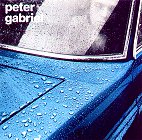 Peter Gabriel’s first solo effort is an eye-opener for this kid who’d heard little of the former Genesis frontman until 1986’s So. I’ve always been impressed and inspired by the vast expanses of Gabriel’s musical style, and his 1977 album is no exception. So much has been made of Gabriel as world music spokesman and human rights activist, I sometimes think we’ve forgotten the splendor of Peter Gabriel, rock musician. The straight-ahead pop of “Solsbury Hill”, the harmonies of “Excuse Me”, and the orchestral-rock anthem “Down The Dolce Vita” speak to that oft-overlooked ability that Gabriel has to synthesize different styles, and come up with tunes that cross genre lines without sounding like cheesy attempts at crossovers. The music is also boosted by Bob Ezrin’s crisp production – I really wish Ezrin had produced the second album as well (which was instead handled by Robert Fripp). While Fripp clearly had a seminal influence on Gabriel,
Peter Gabriel’s first solo effort is an eye-opener for this kid who’d heard little of the former Genesis frontman until 1986’s So. I’ve always been impressed and inspired by the vast expanses of Gabriel’s musical style, and his 1977 album is no exception. So much has been made of Gabriel as world music spokesman and human rights activist, I sometimes think we’ve forgotten the splendor of Peter Gabriel, rock musician. The straight-ahead pop of “Solsbury Hill”, the harmonies of “Excuse Me”, and the orchestral-rock anthem “Down The Dolce Vita” speak to that oft-overlooked ability that Gabriel has to synthesize different styles, and come up with tunes that cross genre lines without sounding like cheesy attempts at crossovers. The music is also boosted by Bob Ezrin’s crisp production – I really wish Ezrin had produced the second album as well (which was instead handled by Robert Fripp). While Fripp clearly had a seminal influence on Gabriel,  there’s something clean and uncluttered about Ezrin’s presentation on the first album that I really liked. Rather than cloaking the vocals with layers of instrumentation – and, for the record, contrary to some reports, Peter Gabriel can sing – the vocals were crystal clear here. Come to think of it, so was everything else, and that’s something that I miss occasionally in Peter Gabriel’s thickly layered latter-day output.
there’s something clean and uncluttered about Ezrin’s presentation on the first album that I really liked. Rather than cloaking the vocals with layers of instrumentation – and, for the record, contrary to some reports, Peter Gabriel can sing – the vocals were crystal clear here. Come to think of it, so was everything else, and that’s something that I miss occasionally in Peter Gabriel’s thickly layered latter-day output.
- Moribund the Burgermeister (4:19)
- Solsbury Hill (4:20)
- Modern Love (3:37)
- Excuse Me (3:20)
- Humdrum (3:23)
- Slowburn (4:34)
- Waiting For The Big One (7:26)
- Down The Dolce Vita (4:43)
- Here Comes The Flood (5:54)
Released by: Atco
Release date: 1977
Total running time: 42:25
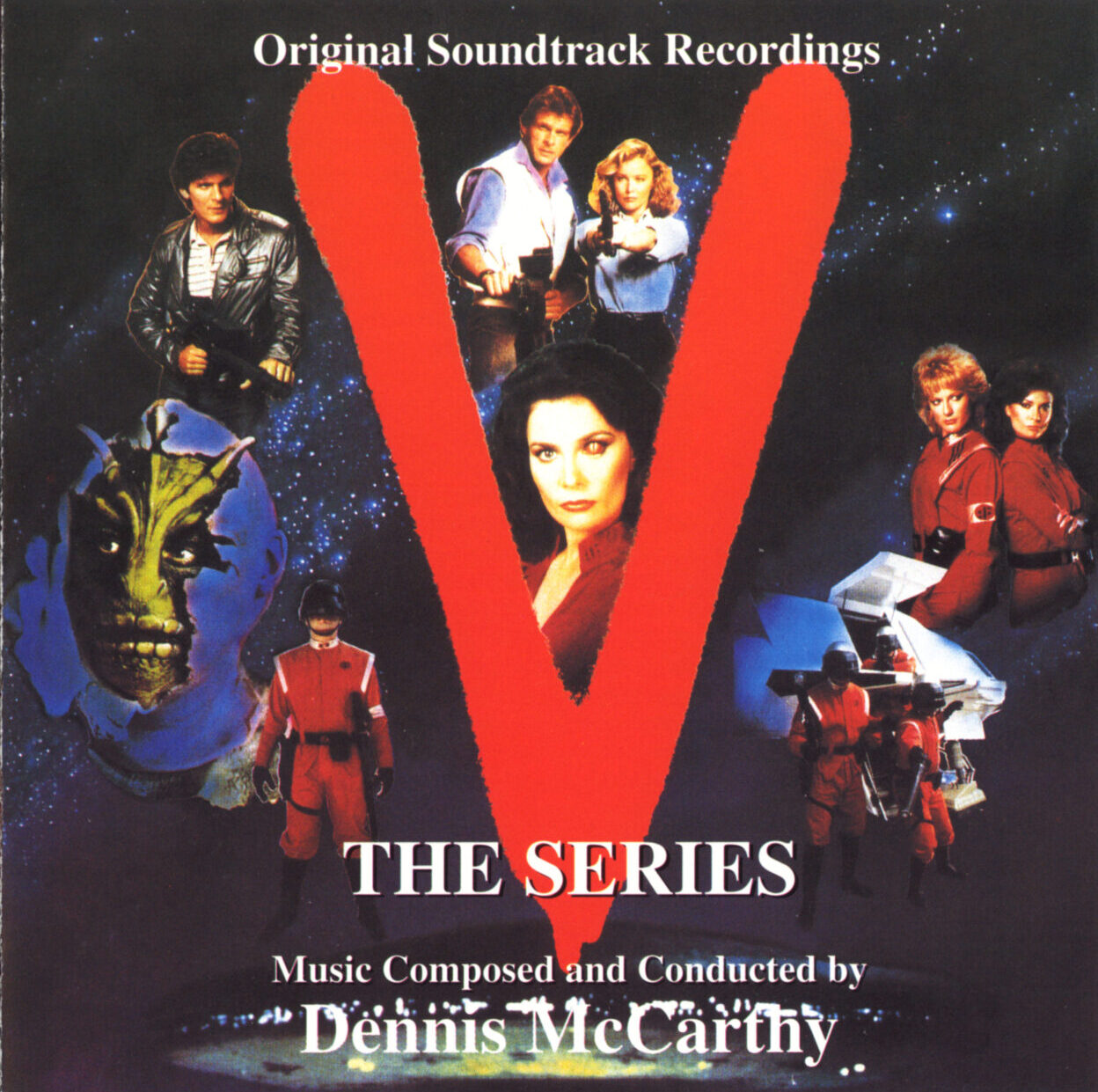
V: The Series – music by Dennis McCarthy
Dennis McCarthy saved the day by rescoring V: The Final Battle for Warner Bros. and NBC, so when the time came to bleed the well of ideas dry for a short-lived weekly series, Dennis was called to compose music for invading lizards once more.
In retrospect, I think his music may be one of the classiest things that V: The Series had in its favor.
Opening up with a much more quickly-paced version of the V: The Final Battle theme as the series main title, the album proceeds quickly into the first episode, where McCarthy pumps things up in an energetic chase sequence which refers to the main title frequently. After the second track, the music slows down and McCarthy begins to display some of the scoring style that has become a mainstay on the various Star Trek spinoffs.
Some of the standouts include the minute-long “Star Child” track, which introduces a choral motif for the now-grown-up Elizabeth, and the following track, “Lift Off Into Space”, jumps back and forth between this choral theme and some nice action segments.
If there’s any one thing which turns me off about McCarthy’s scores for the weekly series, it’s something over  which he may not have had any control. The studio handed the man a decent-sized, well-trained orchestra to use…and then he winds up with a lot of suspiciously synthesized-sounding drums? Give me a break!
which he may not have had any control. The studio handed the man a decent-sized, well-trained orchestra to use…and then he winds up with a lot of suspiciously synthesized-sounding drums? Give me a break!
Like the V: The Final Battle CD, this composer promo may be worth the search for any big V fans, or fans of Dennis McCarthy’s musical style.
- V: The Series main title (4:18)
Liberation Day
- Space Chase (1:06)
- Martin’s Death (4:55)
Dreadnaught
- Elizabeth’s Rebirth (1:50)
- Enter Diana / Elizabeth Grows Up (1:55)
- The Star Child (4:00)
- Lift Off Into Space (0:59)
- Farewell / Dreadnaught (2:23)
The Sanction
- Elizabeth’s Theme (5:30)
- A Sunny Day (2:39)
- Kyle and Elizabeth (2:13)
Visitor’s Choice
- Lounge Lizards (1:20)
The Deception
- Seductive Dream (3:08)
Reflection In Terror
- Doppelganger’s Demise (1:57)
The Conversion
- Rats R Us (2:52)
The Betrayal
- Nathan’s End (1:04)
- Lizard Courtship (4:35)
The Rescue
- Wedding Fanfare / Banquet Music (4:13)
- Reception Music (3:26)
- Adios, Charles (4:09)
The Betrayal
- Finale (2:57)
- V: The Series end credits (1:57)
Released by: SuperTracks
Release date: 1998
Total running time: 59:13
Duran Duran – Rio
 Almost certainly the quintessential Duran Duran album – well, hey, it sure wasn’t Seven And The Ragged Tiger – and, oddly enough, it’s also my favorite of their output. It’s not often that my favorite album by any given group is also the one most people consider their best work. For example, ELO’s Out Of The Blue seems to be held up most often as the quintessential ELO album, the cream of that band’s crop. But I point to earlier albums Eldorado and A New World Record as better examples of what made ELO unique. The point of that example is that surely everyone remembers Rio, and I’d wager a good lump of money on Rio being the one Duran Duran album most people are likely to own.
Almost certainly the quintessential Duran Duran album – well, hey, it sure wasn’t Seven And The Ragged Tiger – and, oddly enough, it’s also my favorite of their output. It’s not often that my favorite album by any given group is also the one most people consider their best work. For example, ELO’s Out Of The Blue seems to be held up most often as the quintessential ELO album, the cream of that band’s crop. But I point to earlier albums Eldorado and A New World Record as better examples of what made ELO unique. The point of that example is that surely everyone remembers Rio, and I’d wager a good lump of money on Rio being the one Duran Duran album most people are likely to own.
They couldn’t pick a better one. Rio is a near-perfect distillation of all of the elements that made Duran Duran listenable…even if some of those things were dated even by the album’s 1981 release date. Prominent on Rio is a lot of very good slap-bass work, a bit of a holdover from the disco era in the early days of new age, but something which always gave Duran Duran a very distinctive sound. Lead singer Simon Le Bon never sounded better than he did here, and even though the songs are occasionally a little thin arrangement-wise, they’re among the best the band ever had to offer. My personal favorite is the ethereal “The Chauffeur”, which drops most of Duran Duran’s dance-beat signature for a nicely-paced, pure new-wave tune with loads of atmosphere. At one point I was crazy about “Save A Prayer”, a lengthy ballad, but today I have to admit it gets on my nerves ever-so-slightly. “Hold Back The Rain” and “Lonely In Your Nightmare” are great hit singles that  never were, but should have been. Hit singles from this album include the overplayed “Hungry Like The Wolf” and the title track.
never were, but should have been. Hit singles from this album include the overplayed “Hungry Like The Wolf” and the title track.
If you’re truly looking for the best of Duran Duran, I’d advise skipping the usual best-of compilations and picking up Rio.
- Rio (5:39)
- My Own Way (4:51)
- Lonely In Your Nightmare (3:50)
- Hungry Like The Wolf (3:41)
- Hold Back The Rain (3:50)
- New Religion (5:33)
- Last Chance On The Stairway (4:21)
- Save A Prayer (5:25)
- The Chauffeur (5:13)
Released by: Capitol
Release date: 1982
Total running time: 42:25
Christopher Franke – Klemania
 This 1995 solo project from Chris Franke, the composer of every episode of Babylon 5, will sound very familiar indeed to those who have heard his TV work. The music heard on this album was originally created for the 1994 KLEM electronic music festival, and one can hear several phrases and motifs also used in Franke’s Babylon 5 scores. About two minutes into the first track, in fact, listeners are treated to an extended rendition of the “party music” heard in the New Years’ Eve scene in Chrysalis.
This 1995 solo project from Chris Franke, the composer of every episode of Babylon 5, will sound very familiar indeed to those who have heard his TV work. The music heard on this album was originally created for the 1994 KLEM electronic music festival, and one can hear several phrases and motifs also used in Franke’s Babylon 5 scores. About two minutes into the first track, in fact, listeners are treated to an extended rendition of the “party music” heard in the New Years’ Eve scene in Chrysalis.
Now, you’re probably expecting me to go off on my tirade about Franke being the James Horner of electronic music, but I actually like Klemania – I like it a lot. It gives us an idea of what Franke’s ideas would sound like when unfettered by spotting sessions, scene changes and commercial breaks. Though often repetitive and rambling – the first two tracks are each over a whopping twenty minutes in length! – there are some bright spots. My best description of Klemania  would be that it’s an excellent disc of background music which occasionally claws its way into the foreground and then subsides again. It’s a nicely effective overview of Franke’s “house style” which would serve as a nice introduction to the uninitiated, or to those interested in his non-film/TV works.
would be that it’s an excellent disc of background music which occasionally claws its way into the foreground and then subsides again. It’s a nicely effective overview of Franke’s “house style” which would serve as a nice introduction to the uninitiated, or to those interested in his non-film/TV works.
- Scattered Thoughts Of A Canyon Flight (22:27)
- Inside The Morphing Space (21:01)
- Silent Waves (4:10)
Released by: Sonic Images
Release date: 1995
Total running time: 47:41
Tim Russ
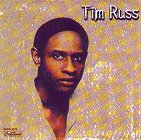 So impressed was I with Tim “Tuvok” Russ’s self-published EP a couple of years ago that I happily picked up his new solo effort, backed up by Neil Norman and the Cosmic Orchestra (a band which is fast gaining a reputation as the de facto musical ensemble at science fiction conventions) and released on Norman’s GNP Crescendo Records label. And Russ still has it – the guy can sing. And covers such as “Crossroads” and “Money Talks” demonstrate that Russ may be missing his greatest calling: the man is a fantastic blues vocalist. He has all the pre-requisite growliness necessary to pass muster with the blues, which you might not guess from hearing him emotionlessly intone technobabble every week on Voyager.
So impressed was I with Tim “Tuvok” Russ’s self-published EP a couple of years ago that I happily picked up his new solo effort, backed up by Neil Norman and the Cosmic Orchestra (a band which is fast gaining a reputation as the de facto musical ensemble at science fiction conventions) and released on Norman’s GNP Crescendo Records label. And Russ still has it – the guy can sing. And covers such as “Crossroads” and “Money Talks” demonstrate that Russ may be missing his greatest calling: the man is a fantastic blues vocalist. He has all the pre-requisite growliness necessary to pass muster with the blues, which you might not guess from hearing him emotionlessly intone technobabble every week on Voyager.
Some other surprising covers also emerge: Cat Stevens’ “Where Do The Children Play?”, Randy Newman’s Louisiana (the only holdover from Tim’s Only A Dream In Rio EP), Bruce Hornsby’s “Great Divide”, and Stephen Stills’ sixties anthem, Love The One You’re With. There are also three originals: “I Can’t Imagine”, “Crazy”, and “Strangers”, the latter two of which especially hint at some hidden songwriting talent. “Crazy” makes a couple of humorous references to Tim’s sudden rise to fame – and that’s as close as this  album comes to having any connection to Star Trek.
album comes to having any connection to Star Trek.
For Tim’s fan following, those curious to hear a Star Trek alumnus who doesn’t belong on a Golden Throats collection, and those who’d like to hear some better-than-decent music by someone that not a lot of people associate with music, I recommend this one.
- I Can’t Imagine (3:20)
- Can’t Do It Like That (3:03)
- I Would Stop The World (5:10)
- Crossroads (2:45)
- Money Talks (4:06)
- Where Do The Children Play (3:18)
- Crazy (3:48)
- Louisiana (3:03)
- Strangers (3:54)
- Great Divide (4:06)
- Love The One You’re With (3:12)
Released by: GNP/Crescendo Records
Release date: 2000
Total running time: 39:49
Econoline Crush – The Devil You Know
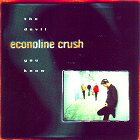 This sophomore effort from the Canadian band that brought us the nicely harmonized electronic rock anthem “All That You Are” is awash in much the same style of production and instrumentation. However, this isn’t a bad thing – I rather like the Econoline Crush style, actually. The album gets a fast-paced start with two of its better tunes, “Surefire” and “Sparkle And Shine”. From there, we’re treated to a couple of uptempo ballads, more near-headbanging material, and – for some reason I can’t fathom – a slightly mellower remix of the song that put the band on the map (“All That You Are x 3”). I’m not sure why the latter is there, unless they wanted to make darn sure that fans of the first album picked this one up. Or perhaps they wanted to ensure sales by including that song in some form on the new album as well as the old, as chances are pretty good that most music buyers would be
This sophomore effort from the Canadian band that brought us the nicely harmonized electronic rock anthem “All That You Are” is awash in much the same style of production and instrumentation. However, this isn’t a bad thing – I rather like the Econoline Crush style, actually. The album gets a fast-paced start with two of its better tunes, “Surefire” and “Sparkle And Shine”. From there, we’re treated to a couple of uptempo ballads, more near-headbanging material, and – for some reason I can’t fathom – a slightly mellower remix of the song that put the band on the map (“All That You Are x 3”). I’m not sure why the latter is there, unless they wanted to make darn sure that fans of the first album picked this one up. Or perhaps they wanted to ensure sales by including that song in some form on the new album as well as the old, as chances are pretty good that most music buyers would be  looking for a familiar title.
looking for a familiar title.
I like Econoline Crush, but I can see where they’d be an acquired taste for some. If you like the idea of an intriguing collision of lots of fast power chords – just this side of speed metal – and electronica, you’ll probably like this one.
- Surefire (3:35)
- Sparkle and Shine (3:42)
- Deeper (3:17)
- Hollowman (3:32)
- Home (3:11)
- The Devil You Know (4:27)
- All That You Are x 3 (3:41)
- Burnt (4:05)
- Haven’t Gone Away (3:46)
- Elegant (3:39)
- Razorblades and Bandaides (5:43)
Released by: EMI Canada
Release date: 1997
Total running time: 44:17
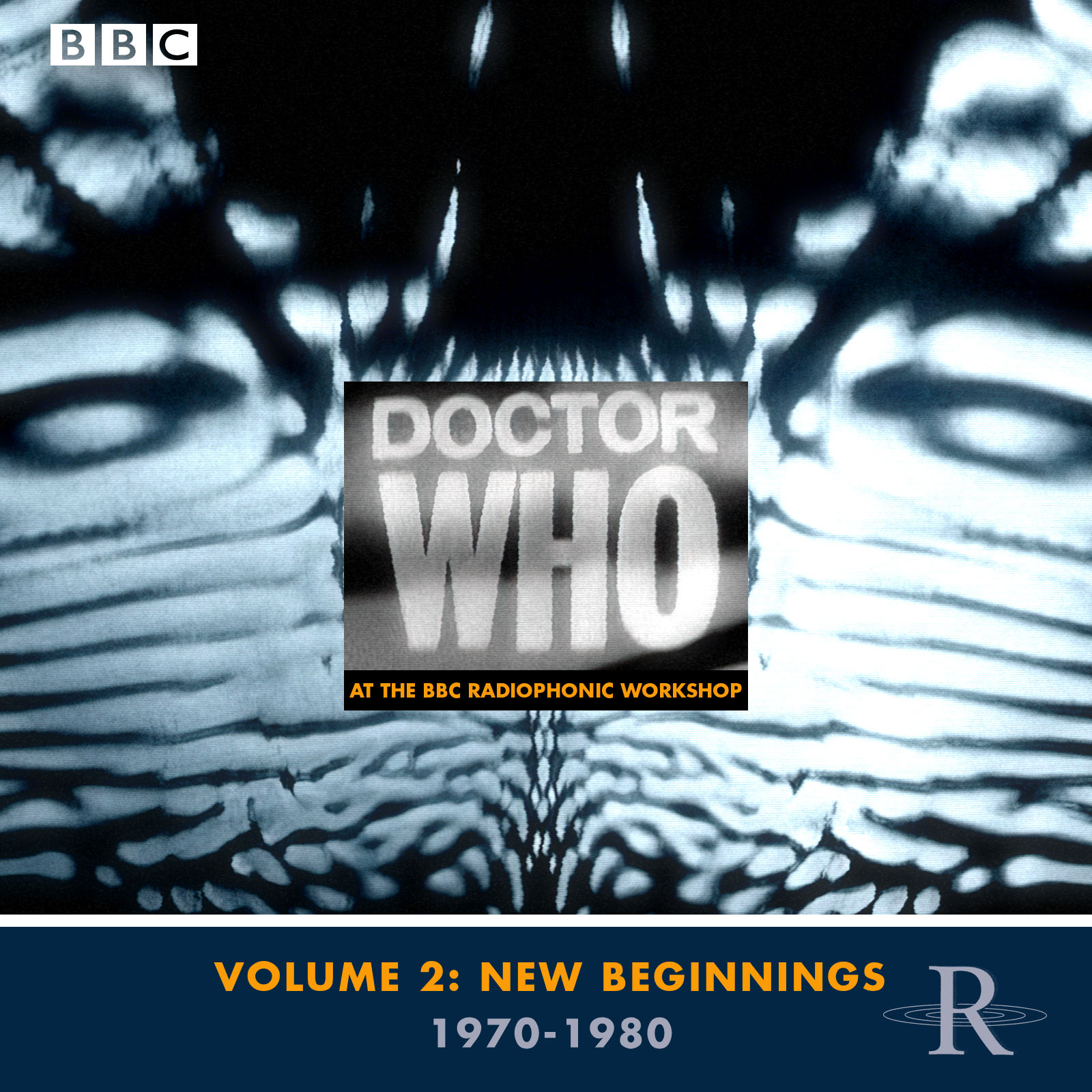
Doctor Who, Volume 2: New Beginnings 1970-1979
 This selection of freshly unearthed, newly remastered music and sound effects from the 1970s, arguably Doctor Who’s heyday with the role being played by Jon Pertwee and Tom Baker (the two longest-serving actors in the part), is quite an interesting listen.
This selection of freshly unearthed, newly remastered music and sound effects from the 1970s, arguably Doctor Who’s heyday with the role being played by Jon Pertwee and Tom Baker (the two longest-serving actors in the part), is quite an interesting listen.
Central to this lengthy CD is a suite of cues from Malcolm Clarke’s score for the 1972 six-parter The Sea Devils, which had previously been represented on an earlier Silva Screen collection by a track of “edited highlights.” Clarke’s abstract electronic music, in fourteen tracks of its full glory, will likely still be inaccessible to many listeners. This is electronic music at its most abstract and challenging. Mark Ayres’ liner notes aren’t kidding when they cite Clarke’s Sea Devils score as “undoubtedly some of the most uncompromising electronic music ever to feature in mainstream popular entertaiment.” In places, the music sounds more like sound effects gone berzerk, and yet in other places, there are clear, tonal ideas being explored. To be honest, I’m actually able to grok the Sea Devils music more now than I did when I first watched the six-parter from which the music originated.
Other gems include some previously unreleased Dudley Simpson cues from The Mind Of Evil and The Claws Of Axos; though Simpson was a freelance composer, he did experiment with the BBC Radiophonic Workshop’s capabilities early in the 1970s. A brief selection of sound effects, none of which – thankfully – were previously released in 1993 as part of 30 Years at the BBC Radiophonic Workshop, draws material from the period between Jon Pertwee’s last season as the Doctor and Tom Baker’s penultimate year in the part.
The real Holy Grail of this whole endeavour comes in the form of two tracks toward the end of the CD. These never-before-heard cues by Peter Howell, who composed many of the better Radiophonic Workshop scores for Doctor Who in the 1980s, were part of a demo recorded to scenes of a 1979 episode to demonstrate to the series’ then-new producer John Nathan-Turner that the Radiophonic Workshop was up to the task of scoring entire episodes in addition to providing sound effects.
Also included is the pre-requisite selection of different versions of the theme music, including the 1970 “stutter-start” edit (which, truth be told, I’ve always rather liked), the infamous “Delaware” version, and other minor variations.
 Is this second volume of the Radiophonic Workshop series worth picking up? Well…maybe. I like it, but the Sea Devils suite may be musical anathaema to those with more traditional tastes, and since that is what takes up most of Volume Two, that will probably determine whether or not you care to shell out your hard-earned money to buy it.
Is this second volume of the Radiophonic Workshop series worth picking up? Well…maybe. I like it, but the Sea Devils suite may be musical anathaema to those with more traditional tastes, and since that is what takes up most of Volume Two, that will probably determine whether or not you care to shell out your hard-earned money to buy it.
- Music: Doctor Who (opening title theme, 1970) (0:46)
- FX: Tardis control on & warp transfer (0:22)
- Blue Veils & Golden Sands (3:25)
- The Delian Mode (3:33)
- The Master’s Theme (0:43)
- Dover Castle (0:39)
- FX: Keller Machine appears/vanishes (0:23)
- Keller Machine Theme (0:42)
- FX: Brain centre atmosphere (0:21)
- The Axons Approach (1:45)
- TARDIS lands (0:22)
- Doctor Who (closing title theme, 1970 (1:13)
- The Prison (1:19)
- The Master (2:05)
- The Naval Base (1:28)
- The Sea Fort (2:13)
- Stranded (2:39)
- The Sea Devil (2:43)
- The Master At Large (3:04)
- Air Conditioning Problem (0:48)
- Duel (1:44)
- The Master’s Plan (1:31)
- The Submarine (1:52)
- Jo Frees The Doctor (1:11)
- Rock Bottom (1:15)
- The Beach (1:57)
- The Minefield (0:23)
- Devil Underwater (1:18)
- The Doctor And Jo On The Run (0:35)
- The Sea Devils Take The Prison (3:24)
- The Diving Bell (1:23)
- Mr. Walker’s War (3:05)
- Torpedo (1:28)
- Attack In Force (2:02)
- Ventilation Shaft (1:20)
- Sea Chase (2:06)
- Escape (0:46)
- Doctor Who (stereo version, 1972) (2:21)
- Doctor Who (Delaware version, 1972) (2:08)
- FX: Aggedor’s temple atmosphere, Peladon (0:59)
- FX: Metebelis 3 atmosphere (1:51)
- FX: Nerva Beacon infrastructure & T-Mat couch (1:42)
- FX: The Planet Karn (1:49)
- FX: The Shrine of the Sisterhood of Karn (1:13)
- FX: The Mandragora Helix (0:46)
- FX: Nova Device Countdown & Explosion (0:12)
- Demo 1 (1:13)
- Demo 2 (1:07)
- Doctor Who (new theme, 1980) (2:42)
Released by: BBC Music
Release date: 2000
Total running time: 78:19
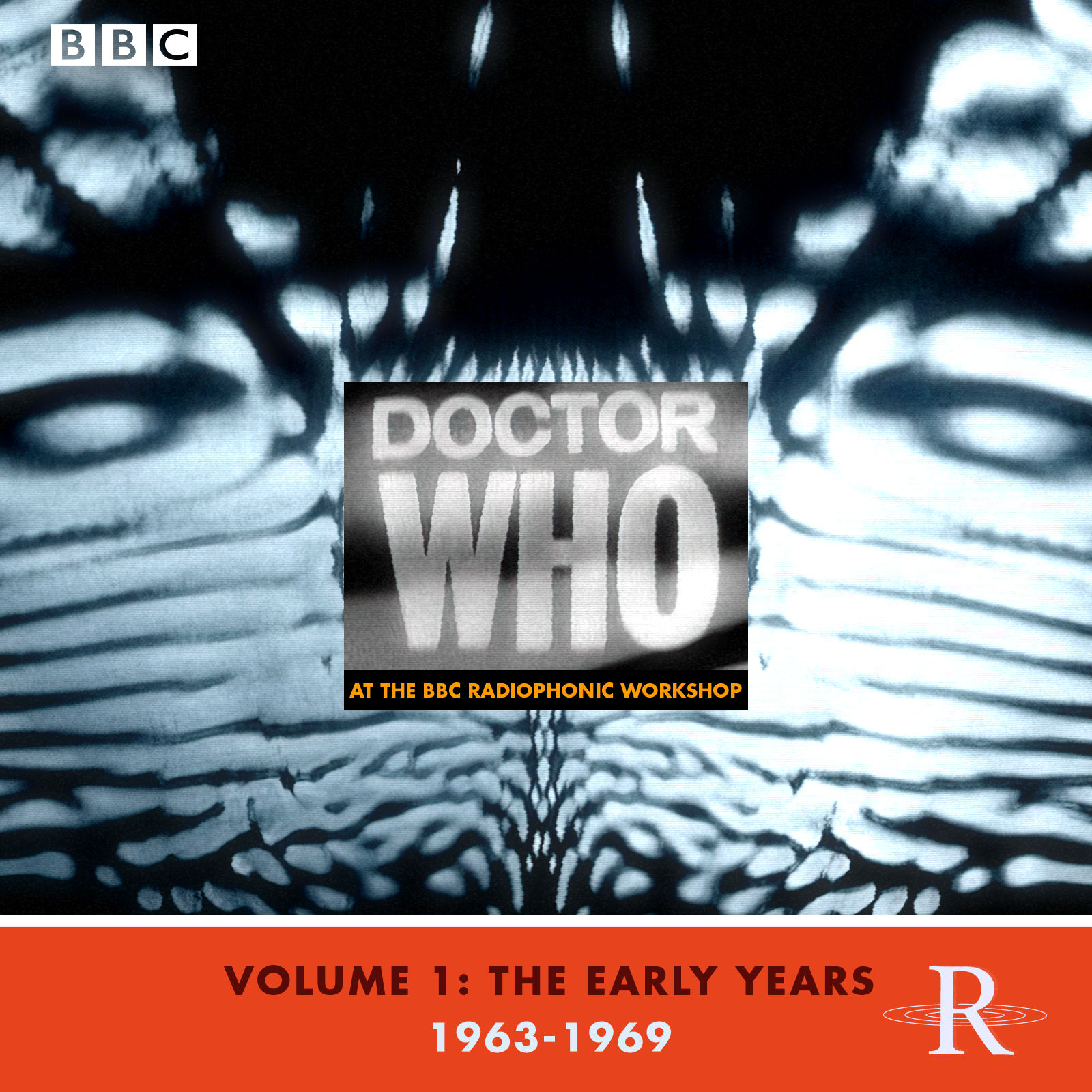
Doctor Who, Volume 1: The Early Years 1963-1969
 The second title in the BBC’s series of remastered sound effects and music compilations is impressive in its scope, even though it leans much more heavily in the direction of effects than it does music.
The second title in the BBC’s series of remastered sound effects and music compilations is impressive in its scope, even though it leans much more heavily in the direction of effects than it does music.
The musical selections on Early Years are limited primarily to the various minor revamps of the ubiquitous Doctor Who theme, as well as a handful of fleeting cues from several other episodes – many of which, surprisingly, are considered “lost” shows, their videotape masters having disappeared from the BBC’s archives. The sound effects accompanying the show’s first-ever regeneration – in which the role of the Doctor is handed to a new actor by the incumbent Doctor in a metamorphosis sequence – is among the biggest of these surprises (and makes me pine even more for BBC Video’s upcoming home video release of The Tenth Planet, the four-parter from which those effects originate, even if its all-important fourth episode will basically by a slide show on tape).
Perhaps the coolest piece of music is “Time In Advance” by BBC Radiophonic Workshop veteran John Baker. This cue, which actually originated with another show but was tracked as background source music in at least two Doctor Who episodes, is heard in two forms: its original ethereal form, and an unbelievable combination of the original cue and a light jazzy piano accompaniment overdubbed. The latter of these is gorgeous even by modern standards, and makes me want to hear more. It’s tragically brief.
As for the sound effects, many of the sounds heard here did not appear on the excellent 1993 30 Years At The Radiophonic Workshop compilation – such as the distinctive “Dalek Control Room” effects which were used in nearly every Dalek-related adventure from 1963 to 1988 – making this one a worthwhile investment for vintage FX buffs.
Given the CD’s heavy emphasis on effects, I can recommend this safely for rabid Doctor Who enthusiasts…but what about casual fans? Unless you’re that intrigued by the theme arrangements and various incidental music snippets I’ve discussed here, I’d pass on it, were I you. But for Doctor Who completists, this is a promising preview of how the Beeb plans on handling future music releases related to the Time Lord’s twenty-seven years on television.
- Music: Doctor Who (original theme) (2:21)
- TARDIS exterior hum and door (0:23)
- Entry into the TARDIS (0:40)
- TARDIS original takeoff sequence (1:47)
- Music: Doctor Who (original title music) (2:09)
- TARDIS takeoff (1:23)
- Skaro: petrified forest atmosphere (1:46)
- TARDIS computer (1:08)
- Dalek city corridor (1:01)
- Dalek control room (0:26)
- Capsule oscillation (0:19)
- Explosion; TARDIS stops (1:10)
- Sleeping Machine (0:52)
- Sensorite speech background (1:10)
- Dalek spaceship lands (0:16)
- TARDIS lands (0:11)
- Chumbley constant run (0:27)
- Chumbley at rest (0:28)
- Chumbley sends message (0:07)
- Chumbley dome (0:19)
- Chumbley dies (0:11)
- Activity on Dalek ship control panel (0:46)
- Energy escapes (0:22)
- Machinery in TARDIS goes wild: regeneration (1:03)
- Regeneration runs down (0:09)
- The Doctor’s transitional trauma (0:52)
- Music: The Fish People (0:37)
- Heartbeat Chase (1:57)
- Music: Chromophone Band (1:56)
- Controller chimes (0:10)
- Music: Time In Advance (3:19)
- Propaganda sleep machine (1:08)
- Music: Doctor Who new opening theme, 1967 (0:51)
- Sting & web / cobweb pulsates (2:04)
- 4 stings (0:18)
- Music: Mr. Oak and Mr. Quill (0:39)
- Lead-in to Cyber Planner (0:14)
- Cyber Planner background (0:37)
- Music: Cyberman stab and music (1:32)
- Rocket stab (0:08)
- Birth of Cybermats (0:44)
- Cybermats attracted to Wheel (0:39)
- Rocket in space (1:49)
- Music: Interior rocket (suspense music) (1:55)
- Music: Servo Robot music (1:28)
- Wheel stab (0:14)
- Cosmos atmosphere (1:08)
- Music: Alien ship music (1:00)
- Jarvis in a dream state (0:47)
- Floating through space (1:14)
- 2 stabs (0:11)
- TARDIS (new landing) (0:18)
- Galaxy atmosphere (1:04)
- Tension builder (A) (0:45)
- Tension builder (B) (0:40)
- Tension builder (C) (1:06)
- Low sting (0:10)
- TARDIS: extra power unit plugged in (1:53)
- Music: Zoe’s Theme (1:19)
- White void (1:16)
- Music: Time In Advance (2:48)
- Cyberman brought to life (1:12)
- Cyber invasion (2:11)
- The learning hall (2:40)
- Entry into the machine (1:33)
- Sting (0:19)
- Music: Machine and City Theme (1:49)
- Music: Kroton Theme (2:13)
- TARDIS land (0:25)
- Alien control centre (0:27)
- Time zone atmosphere (0:40)
- Dimensional control (0:49)
- War Lord arrival (0:16)
- Silver box: the Doctor calls for help (1:02)
- Time Lord Court atmosphere (1:18)
- Music: Doctor Who closing titles (0:41)
Released by: BBC Music
Release date: 2000
Total running time: 78:23
Split Enz – Rear Enz
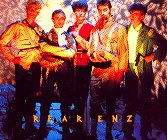 Collected here in one easy-to-grab chunk is the entire ’80s career of Split Enz, courtesy of Mushroom Records. Normally I rail against labels reissuing the unpteenth iteration of a band’s greatest hits, but since we’re getting the whole albums here, I can honestly give you hearty recommendations for this set. My big gripe with the five original albums included in this 6-CD box set has nothing to do with sound quality – everything was cleaned up by Enz keyboard whiz Eddie Rayner for this re-release – but everything to do with packaging. When the Split Enz 70s box set was released, there was at least some attempt to retain the original LP artwork, front and back, in some form. Not so here – and I wouldn’t be griping unless this omission involved the best back-cover art ever, Time & Tide‘s photo montage. Okay, so maybe that’s something not everyone’ll see as a problem, but it honked me off a bit. As I noted, had the same effort not been made for the 70s set, I would have shrugged it off more easily.
Collected here in one easy-to-grab chunk is the entire ’80s career of Split Enz, courtesy of Mushroom Records. Normally I rail against labels reissuing the unpteenth iteration of a band’s greatest hits, but since we’re getting the whole albums here, I can honestly give you hearty recommendations for this set. My big gripe with the five original albums included in this 6-CD box set has nothing to do with sound quality – everything was cleaned up by Enz keyboard whiz Eddie Rayner for this re-release – but everything to do with packaging. When the Split Enz 70s box set was released, there was at least some attempt to retain the original LP artwork, front and back, in some form. Not so here – and I wouldn’t be griping unless this omission involved the best back-cover art ever, Time & Tide‘s photo montage. Okay, so maybe that’s something not everyone’ll see as a problem, but it honked me off a bit. As I noted, had the same effort not been made for the 70s set, I would have shrugged it off more easily.
The real treasure here is the sixth disc, a bonus CD of non-album B-sides, demos and other rarities. Much more entertaining than the first box set’s disc of extras, this one is a solid slice of studio material with no live cuts (and really, why bother when The Living Enz has this part of the band’s career covered so well?). “Fire Drill” is an early Tim/Neil Finn collaboration (with Eddie Rayner getting a credit as well), and makes one wish that the Finn brothers had written more Split Enz material together – it’s definitely hit material. “Next Exit”, written by Tim and released as a stopgap single between albums in 1983, is another guilty favorite of mine – it’s goofy as hell lyrically, and yet still listenable. Other Tim songs – “Big Heart”, “Parasite”, “In The Wars”, “Remember When” – all have their own quirky appeal.
The real fascination here is the chance to witness – in an aural way at any rate – the evolution of songs that would later see release in other forms. Neil’s “I Walk Away” is heard in two early forms (“Your Inspiration” and the surprisingly disco-fied “Love & Success”, though portions of the latter became “Can’t Carry On”), with drastic steps yet to be made in both lyrics and the structure of the song’s melody itself. Even more revealing is Tim’s “Mr. Catalyst”, a jumpy dance tune which would be given entirely new lyrics and held back until his second solo album, Big Canoe, where it became “Spiritual Hunger” – though certain Eddie Rayner-penned instrumental breaks were lifted out of it completely and transplanted to Neil’s “Years Go By” on the final Split Enz album to great effect. Rayner also contributes an instrumental number all his own, “Over Drive”.
 And the money shot of the Rear Enz bonus disc? Easy one – Neil’s “Serge”, a song dating back to his pre-Enz days in a band called After Hours (when it was titled Late In Rome). While it’d be easy to say that Rayner’s synth-sampled strings make the song, it’s a lovely example of Neil’s early ballad writing. (And it’s no surprise that it was a fan favorite in Crowded House’s live shows.)
And the money shot of the Rear Enz bonus disc? Easy one – Neil’s “Serge”, a song dating back to his pre-Enz days in a band called After Hours (when it was titled Late In Rome). While it’d be easy to say that Rayner’s synth-sampled strings make the song, it’s a lovely example of Neil’s early ballad writing. (And it’s no surprise that it was a fan favorite in Crowded House’s live shows.)
The first five discs in this set are also available separately and have been reviewed previously: True Colours, Corroborree, Time & Tide, Conflicting Emotions and See Ya Round.
- Fire Drill (3:11)
- Your Inspiration (3:27)
- Parasite (2:44)
- Next Exit (4:15)
- Over Drive (4:17)
- Serge (4:06)
- In The Wars (4:08)
- Love & Success (3:43)
- Big Heart (3:41)
- Mr. Catalyst (2:59)
- Remember When (3:50)
Released by: Mushroom
Release date: 1992
Bonus disc total running time: 44:24
Betchadupa
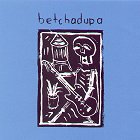 Catchy music seems to be a family affair among the members of New Zealand’s Finn clan, as this EP featuring Liam Finn – son of Crowded House frontman Neil Finn – demonstrates.
Catchy music seems to be a family affair among the members of New Zealand’s Finn clan, as this EP featuring Liam Finn – son of Crowded House frontman Neil Finn – demonstrates.
Boasting only half a dozen songs, the self-titled Betchadupa EP puts to rest any comparison between this group’s young members, and, let’s say for example, Hanson. And to say that the production style shows a little bit of influence from Liam’s dad’s latest solo album would be an understatement.
The better tunes include the lively “Derelict” (which sounds – production-wise, though not musically, a little like “Souvenir”), the bouncy “Empty Head”, and the slow, Beatlesque “Spill The Light”. This latter track demonstrates that Liam has picked up quite a few of his father’s stylistic licks. All of them are originals written by the band members themselves.
The production is a little rough in places, but it’s important to remember that Betchadupa’s freshman effort is basically a demo  which has gotten more attention than most demos thanks to one of its members’ family connections. This shows the potential that Betchadupa could have.
which has gotten more attention than most demos thanks to one of its members’ family connections. This shows the potential that Betchadupa could have.
And from the sound of this release, they have a lot of potential.
- Empty Head (3:08)
- Spill The Light (3:34)
- Bits (1:33)
- Mr. White (2:03)
- Derelict (3:25)
- Heavy Dog (2:20)
Released by: Flying Nun
Release date: 2000
Total running time: 16:06
Supertramp – The Best of Supertramp
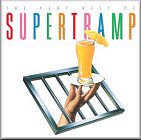 Supertramp has always been a musical class act. Not many bands can harmonize, both instrumentally and vocally, the way they do. And while we’re not talking about “Bohemian Rhapsody”-type vocal harmonies, they do make for a nice throwback to the 1950s. This, then, is their best-of album…but it presents a unique problem. Rather like A Flock of Seagulls, how do you get a full-length compilation out of a group that really blew its whole wad of talent on a select handful of songs?
Supertramp has always been a musical class act. Not many bands can harmonize, both instrumentally and vocally, the way they do. And while we’re not talking about “Bohemian Rhapsody”-type vocal harmonies, they do make for a nice throwback to the 1950s. This, then, is their best-of album…but it presents a unique problem. Rather like A Flock of Seagulls, how do you get a full-length compilation out of a group that really blew its whole wad of talent on a select handful of songs?
Don’t get me wrong, I’m not slamming Supertramp, but I have listened to their actual albums in the past and  got the very distinct impression that the effort was spent on the singles – the stuff which was going to get airplay. The solution for that is their best-of album, which puts all of the familiar tunes, and a few less-familiar ones, into something of a vaguely chronological order for the benefit of those who, like myself, enjoy the music but fall short of really being fans.
got the very distinct impression that the effort was spent on the singles – the stuff which was going to get airplay. The solution for that is their best-of album, which puts all of the familiar tunes, and a few less-familiar ones, into something of a vaguely chronological order for the benefit of those who, like myself, enjoy the music but fall short of really being fans.
- Goodbye Stranger (4:29)
- The Logical Song (3:47)
- Bloody Well Right (4:15)
- Breakfast In America (2:18)
- Rudy (7:17)
- Take The Long Way Home (4:05)
- Crime Of The Century (5:32)
- Dreamer (3:31)
- Ain’t Nobody But Me (5:06)
- Hide In Your Shell (6:47)
- From Now On (6:10)
- Give A Little Bit (4:07)
- It’s Raining Again (4:22)
- Cannonball (4:51)
Released by: A&M
Release date: 1987
Total running time: 67:22
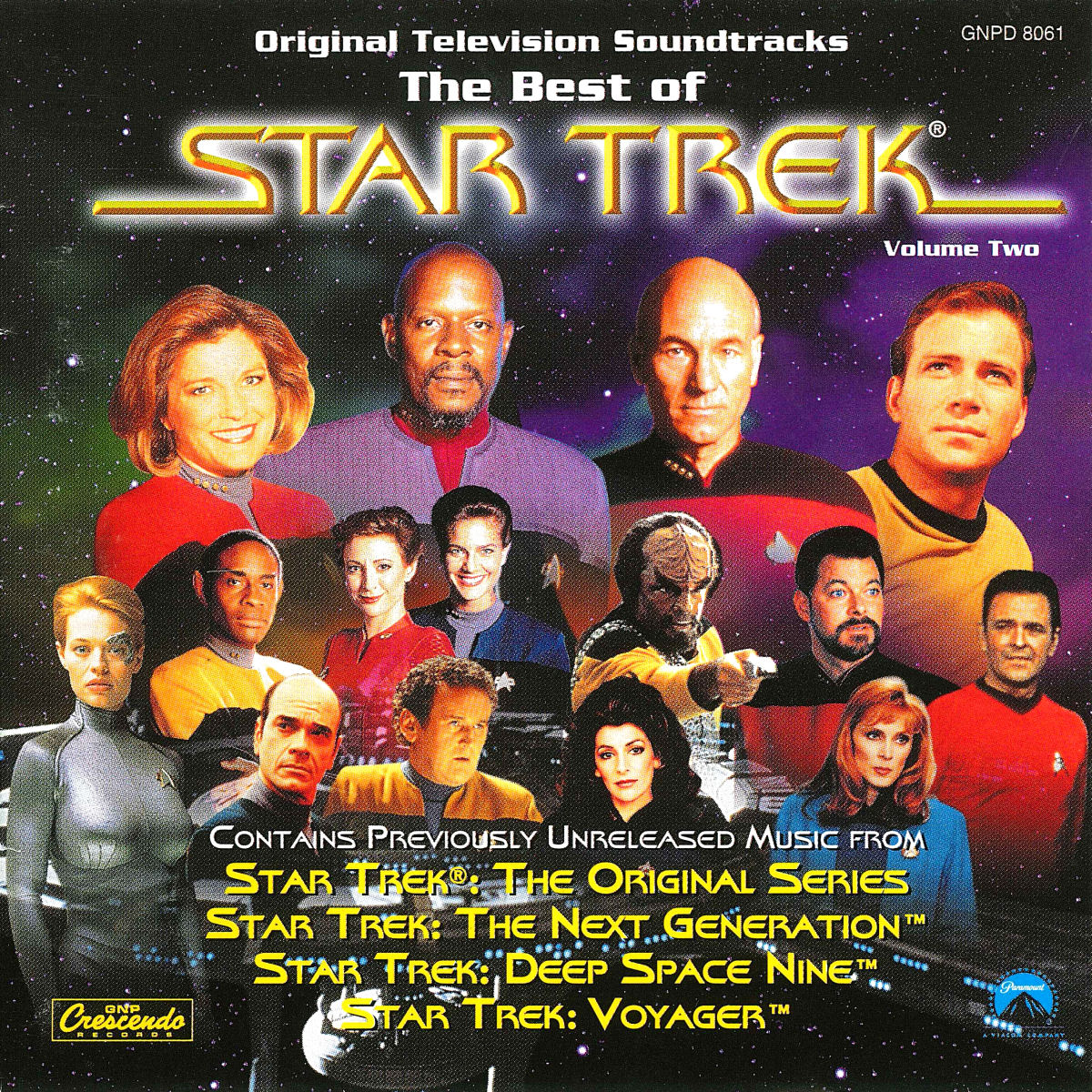
The Best of Star Trek, Volume Two
 This new collection of previously unreleased suites from various episodes of all of Star Trek’s live-action incarnations includes some of the most requested music from all of the series – and a few extras as well.
This new collection of previously unreleased suites from various episodes of all of Star Trek’s live-action incarnations includes some of the most requested music from all of the series – and a few extras as well.
The classic series is easily the show best represented by this CD, with music from The Corbomite Maneuver, Balance Of Terror, What Are Little Girls Made Of? and a “lounge” version of the show’s main theme which was used in a small number of episodes as background source music. Though the Corbomite and Balance scores have been re-recorded in part on past releases by Varese Sarabande, it’s always nice to hear the original recordings rolled out and remastered. They sound great.
Deep Space Nine is represented by a suite from the fourth season opener, The Way Of The Warrior, which introduced Worf as a permanent feature of the DS9 landscape. The music is big and bold…and, by and large, lifted directly from the music of Star Trek: Generations. Go ahead – listen to the “Final Fight” track on the Generations CD and then the Way Of The Warrior suite, back-to-back. The similarities are stunning. Not to say that it’s bad music…just that we’d heard it before. I would much rather have heard some music from season two’s three-part epic premiere.
Also included in the DS9 section is the televised mix of the main theme from seasons 4-7 (a previous version, heard on the original Best Of Star Trek CD in 1996, featured more percussion than the version actually used to open each episode), as well as Nana Visitor’s version of “Fever” from His Way (the first Vic Fontaine episode). The latter is quite nice – Nana’s no Shirley Bassey, but “Fever” is supposed to be moaned and growled more than it’s sung anyway. It’s a nice companion to Jimmy Darren’s album of tunes performed by Vic on DS9.
The DS9 suite is also plagued by another problem – an incorrect table of contents in the CD’s liner notes booklet which omits a track of Warrior score and adds one more track of music from the Voyager suite than actually appears on the CD. The track list below is the correct track list.
Voyager is also represented by an uncharacteristically bombastic score, David Bell’s music from The Bride Of Chaotica. Incredibly atypical of the most recent Trek spinoff’s usually somnolent scoring, Bell’s music is an over-the-top homage to Flash Gordon-style pulp sci-fi radio epics of yesteryear. Some of the most interesting moments in the Chaotica score occur when the music shifts gears abruptly between the retro-40’s music and Bell’s more frequently-used style. Sadly, in these few very brief “modern” passages, one hears – more or less – the entire gamut of Bell’s typical Voyager score, as he too has fallen victim to replicating his own work under the constraints of time and – in all likelihood – the limited inspiration provided by the average Voyager episode.
The album does at least pick a good note on which to close, however: several minutes of music from Dennis McCarthy’s score from the Next Generation finale, All Good Things. This score, though it too features some musical repetition, features some of the best moments from the last episode. The “Saved Again” cue accompanies the memorable scene of the refitted Enterprise saving the collective butts of the crew of Beverly Crusher’s doomed U.S.S. Pasteur, and the cryptically titled “I Have A Gun” is the wonderful final shot of the episode, in which the crew’s last poker game dissolves into the Enterprise’s flight into an alien sunset, set to the strains of Alexander Courage’s Star Trek fanfare, bringing things nicely full-circle. (Shouldn’t this track have been called “The Sky’s The Limit”?)
There’s one cue I wish they’d included though: Picard’s first view of the Enterprise as Tasha ferries him to the ship for the first time via shuttle.
Overall, the second volume of The Best Of Star Trek will satisfy fans of nearly every one of the  show’s incarnations, particularly fans of the classic series that started it all. Here’s hoping that it won’t take four more years for volume three. There’s enough unreleased Trek music to merit a yearly release (hell, there’s enough unreleased music to fill a monthly CD magazine, but the economics of that kind of venture would be nightmarish for both label and consumer, so I’d settle for a yearly release).
show’s incarnations, particularly fans of the classic series that started it all. Here’s hoping that it won’t take four more years for volume three. There’s enough unreleased Trek music to merit a yearly release (hell, there’s enough unreleased music to fill a monthly CD magazine, but the economics of that kind of venture would be nightmarish for both label and consumer, so I’d settle for a yearly release).
- Theme from Star Trek – string arrangement (0:51)
- The Corbomite Maneuver (4:29)
- Balance Of Terror (3:42)
- What Are Little Girls Made Of? (4:39)
- In Chapel (1:18)
- Theme from Star Trek – lounge mix (1:39)
Suite from The Way Of The Warrior
- Theme from Star Trek: Deep Space Nine – season 4 (1:55)
- Dry Run (1:31)
- Medieval Harp source (2:57)
- Worf (1:35)
- “Yo!” (4:08)
- Worf II (1:47)
- Fever (2:01)
Suite from The Bride Of Chaotica
- Theme from Star Trek: Voyager (1:47)
- Begin Chapter 18 (4:21)
- Presenting…Arachnia (3:07)
- Chaotica Is Defeated / Distortions (3:43)
- Chaotica’s Last Words / The End (1:05)
Suite from All Good Things…
- Theme from Star Trek: The Next Generation – season 2 (1:40)
- Here Comes The Judge II / To The Rescue (5:59)
- Primalosity (2:29)
- Courage (3:31)
- Saved Again (2:26)
- I Have A Gun (0:52)
Released by: GNP Crescendo
Release date: 2000
Total running time: 63:42
Electric Light Orchestra – The BBC Sessions
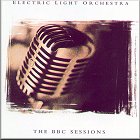 Well, I guess this is proof that I’m a sucker for nearly anything with the Electric Light Orchestra’s name on the cover. This latest release from Eagle Records, the people who brought us rather nice CD pressings of concert recordings from ELO’s 1975 and 1978 tours, is a collection of studio numbers from the band’s appearances on BBC Radio’s Bob Harris Sessions show between 1972 and 1974. If it sounds like I’m a little bit skeptical, it’s because in places the songs on this CD sound exactly like the studio versions that eventually saw light on their respective albums. “Kuiama” especially raised my suspicions – are we sure that this isn’t the same cut that wound up on ELO II? Either that, or ELO really was the best live band in the world, managing to duplicate the entirety of a song, right down to its production nuances, in a live performance!
Well, I guess this is proof that I’m a sucker for nearly anything with the Electric Light Orchestra’s name on the cover. This latest release from Eagle Records, the people who brought us rather nice CD pressings of concert recordings from ELO’s 1975 and 1978 tours, is a collection of studio numbers from the band’s appearances on BBC Radio’s Bob Harris Sessions show between 1972 and 1974. If it sounds like I’m a little bit skeptical, it’s because in places the songs on this CD sound exactly like the studio versions that eventually saw light on their respective albums. “Kuiama” especially raised my suspicions – are we sure that this isn’t the same cut that wound up on ELO II? Either that, or ELO really was the best live band in the world, managing to duplicate the entirety of a song, right down to its production nuances, in a live performance!
But “Roll Over Beethoven” and “From The Sun To The World” are clearly not the same recordings I’ve heard at least two hundred times. Jeff Lynne’s vocals are a big part of the difference – in some places he sings a little rougher, and in a few places on the latter track, he actually sings a little better than he did on the final cut which made it to vinyl in 1972. The instrumentation is also significantly different on “From The Sun”, including a guitar solo in place of a violin solo during the instrumental break, and some much heavier synth work courtesy of Richard Tandy. Sadly, this song also fades out just as it’s starting to kick into the series of lightning-fast solos.
The Bob Harris Sessions version of “Mama” (listed on this CD, and on quite a few other compilations, as “Momma”) is outstanding – miles ahead of what actually made the cut for ELO II in 1972. Unusually, Lynne’s vocals are very dry, free from the echoplexing and reverb with which he usually drenched his own singing in post-production. And Jeff Lynne is an excellent singer – this track proves that he didn’t need to hide behind all the effects for so many years. The harmonies are also much wider, almost Queen-like, and better mixed. It almost sounds like an Armchair Theatre outtake of a recent cover version of the song.
“In The Hall Of The Mountain King” has never really been an ELO track I’ve listened to a lot, but this live version is another testament to Jeff Lynne’s guitar skills, the strength of ELO’s string section in the early 1970s, and the thundering intensity of Bev Bevan in his prime.
The final suite of five tracks is where I get sorely disappointed with this album. These songs, all from On The Third Day, sound exactly, in every detail and every tiny nuance, like the recordings I’ve heard on Third Day for more than half my life. It’s a damn shame – I would have loved to hear alternate takes or even different mixes of these songs from one of the band’s most mysterious and intricate albums. Simply lifting tracks from the album for this CD is the equivalent of the studio version of “Standin’ In The Rain” which opens the video of the 1978 Wembley Arena concert…it’s more than a little bit misleading.
 So, the final question is…for those die-hard fans who have heard every last ELO song in existence a thousand times, is it worth the effort to track this CD down? I’m such a fan myself, so my answer is a “Yes!”…but that’s a qualified yes. Even if it’s just for this version of “Mama”, I recommend the BBC Sessions album to those who have the time and money to blow on finding this one.
So, the final question is…for those die-hard fans who have heard every last ELO song in existence a thousand times, is it worth the effort to track this CD down? I’m such a fan myself, so my answer is a “Yes!”…but that’s a qualified yes. Even if it’s just for this version of “Mama”, I recommend the BBC Sessions album to those who have the time and money to blow on finding this one.
- Kuiama (11:05)
- Roll Over Beethoven (7:40)
- From The Sun To The World (7:19)
- Momma (6:56)
- In the Hall of the Mountain King (5:42)
- King of the Universe (2:35)
- Bluebird Is Dead (4:24)
- New World Rising (4:01)
- Daybreaker (3:31)
- Ma Ma Ma Belle (3:40)
Released by: Eagle / Edel
Release date: 1999
Total running time: 56:56
Oceania
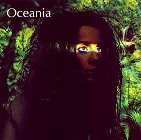 For years, I’ve been addicted to music from New Zealand’s royal family of pop music, the Finns (of Split Enz and Crowded House fame). Not so long ago, however, I saw a CNN piece on a new Kiwi project which not only sounded interesting, but drew heavily from New Zealand’s Maori heritage (another subject with which I’m fascinated). This new musical entry was called Oceania, and it took me forever to find a copy. But the search was well worth it (and now, as you can see from the ubiquitous purchase link on this page, it’s suddenly easy to find!).
For years, I’ve been addicted to music from New Zealand’s royal family of pop music, the Finns (of Split Enz and Crowded House fame). Not so long ago, however, I saw a CNN piece on a new Kiwi project which not only sounded interesting, but drew heavily from New Zealand’s Maori heritage (another subject with which I’m fascinated). This new musical entry was called Oceania, and it took me forever to find a copy. But the search was well worth it (and now, as you can see from the ubiquitous purchase link on this page, it’s suddenly easy to find!).
Oceania is the brainchild of artist Hinewehi Mohi and producer Jaz Coleman. Combining modern-day grooves and production with indigenous acoustic instrumentation and lyrics sung entirely in Maori, Oceania comes across as something that might appeal to Enigma fans, though the sound is much more ambient. Coleman deftly blends acoustics and synths to create a wall of sound which manages to avoid sounding mismatched. Hinewehi’s vocals are clearly the star of the album, however: in many places ethereal and Julee-Cruise-esque, her singing is always enjoyable, even if you can’t follow the lyrics. (Don’t speak Maori? That’s okay – the lyric  booklet has complete translations.)
booklet has complete translations.)
Even on the more heavily percussive numbers, such as “Pukaea (The Trumpet)”, the sound of Oceania is relaxing, textured, and primal. Highest recommendations.
- Pukaea (The Trumpet) (6:32)
- Kotahitanga (Union) (4:41)
- Hautoa (Warrior) (4:46)
- Hinerakatauri (Goddess of Music) (4:55)
- He Tangata (People) (5:37)
- Kihikihi (Cicada) (6:23)
- Haera Ra (Farewell) (5:35)
- Pepepe (The Moth) (6:17)
- Tino Rangatiratanga (Self-Determination) (6:11)
- Hautoa – Beatmasters 7″ mix (4:41)
- Kotahitanga – Beatmasters 7″ mix (3:28)
Released by: Point Music / Universal
Release date: 1999
Total running time: 59:08
James Darren – This One’s From The Heart
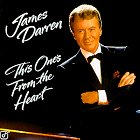 Jimmy Darren is back, baby! Inspired by his two-season stint as swingin’ holographic lounge singer Vic Fontaine on Star Trek: Deep Space Nine, Darren has graced our CD shelves with this collection of oldies. Many of these songs were performed by Darren’s character in the Trek spinoff, while others are songs from the same period of American popular songwriting. Whichever category they fall into, all of the songs are safe in Darren’s capable hands. He’s never sounded better, and the big band backing him up gives that sound a classy boost.
Jimmy Darren is back, baby! Inspired by his two-season stint as swingin’ holographic lounge singer Vic Fontaine on Star Trek: Deep Space Nine, Darren has graced our CD shelves with this collection of oldies. Many of these songs were performed by Darren’s character in the Trek spinoff, while others are songs from the same period of American popular songwriting. Whichever category they fall into, all of the songs are safe in Darren’s capable hands. He’s never sounded better, and the big band backing him up gives that sound a classy boost.
Among this album’s highlights are excellent renditions of “It’s Only A Paper Moon” (used in an outstanding DS9 episode of the same name), “I’ve Got The World On A String” (heard in the same episode), “The Way You Look Tonight” (heard just before things went to hell – literally – in the series finale), “Here’s To The Losers”, “The Best Is Yet To Come” (sorry, no Avery Brooks duet), and “I’ve Got You Under My Skin”. Though these songs have been made immortal by Ol’ Blue Eyes and others, Darren makes them his own here. His delivery has never been smoother. It’s enough to make you wonder why he’s wasting his time on Hollywood when he can sing like this – but then again, as the liner notes repeatedly acknowledge, he might not have gotten around to re- igniting his singing career had he not been cast in the role of Vic Fontaine.
igniting his singing career had he not been cast in the role of Vic Fontaine.
Whether you’re a Trek fan who really dug Darren’s recurring guest shots on Deep Space Nine, or a longtime Darren devotee who’s been wondering whatever happened to Jimmy since “Goodbye Cruel World” and The Time Tunnel, this one is definitely worth a listen. Smooth!
- The Best Is Yet To Come (2:26)
- Come Fly With Me (3:06)
- That Old Black Magic (3:08)
- All The Way (4:18)
- It’s Only A Paper Moon (2:32)
- I’ve Got The World On A String (2:06)
- You Better Love Me (2:04)
- Sophisticated Lady (4:57)
- Just In Time (2:22)
- I’ve Got You Under My Skin (3:14)
- The Way You Look Tonight (4:37)
- Here’s To The Losers (3:21)
- You’re Nobody ‘Till Somebody Loves You (2:18)
- Dancing In The Dark (3:02)
- Night And Day (2:21)
- I’ll Be Seeing You (3:08)
- Satin Doll (3:29)
Released by: Concord Jazz
Release date: 1999
Total running time: 52:39
Lindsey Buckingham – Go Insane
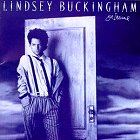 Lindsey Buckingham’s second solo effort has evidently never hit me in the right place or at the right time. There are songs on here that I dearly love – “Go Insane” and “I Want You” – but there are also songs that I cannot stand (the far-too-long “Play In The Rain” being a prime example). One would think that the greater abundance of electronic instruments and tools available to Buckingham in 1984 would’ve given him a broad new palette to use well…but it quickly becomes painfully obvious that this man would do well to stick with guitar rock. Samplers and drum machines do not a good song make without some inkling of how to distribute them throughout the arrangement.
Lindsey Buckingham’s second solo effort has evidently never hit me in the right place or at the right time. There are songs on here that I dearly love – “Go Insane” and “I Want You” – but there are also songs that I cannot stand (the far-too-long “Play In The Rain” being a prime example). One would think that the greater abundance of electronic instruments and tools available to Buckingham in 1984 would’ve given him a broad new palette to use well…but it quickly becomes painfully obvious that this man would do well to stick with guitar rock. Samplers and drum machines do not a good song make without some inkling of how to distribute them throughout the arrangement.
There are some moments of brilliance here, to be sure. “Go Insane” and “Bang The Drum” demonstrate some of Buckingham’s best production licks, including rapid-fire vocals which alternate stereo channels so every other word is in your left ear, but every other word is in your right ear – Buckingham’s music is always best as headphone listening. “I Must Go” is another must-listen…and one wonders, from the lyrics, if it might not be a song about a certain Ms. Nicks’ habits. (Not that every member of the Mac didn’t have their vices by this point…)
I can’t tell you how much I don’t like “Play In The Rain”. With its minimal lyrics, annoying barrage of samples and sounds, and the fact that it’s spread out over two parts (for no readily apparent reason), I have plenty of reasons to skip both tracks anytime I listen to Go Insane. I understand that he was probably experimenting with new and exciting sounds…but this is  one experiment that really doesn’t hold up.
one experiment that really doesn’t hold up.
I give Go Insane a cautious recommendation. You’d better be an ardent fan of Mr. Buckingham’s to sit through this entire album.
- I Want You (3:19)
- Go Insane (3:05)
- Slow Dancing (4:06)
- I Must Go (4:51)
- Play In The Rain (3:21)
- Play In The Rain – continued (4:15)
- Loving Cup (5:02)
- Bang The Drum (3:31)
- D.W. Suite (6:50)
Released by: Warner Bros.
Release date: 1984
Total running time: 38:22
The Best of A Flock Of Seagulls
 Oh, go ahead, laugh! You can’t go wrong with A Flock Of Seagulls. Oft incorrectly labeled as a one-hit wonder (excuse me, but they did both “I Ran” and “Wishing”, the latter of which is only slightly more obscure than the former), A Flock Of Seagulls has one of those distinctly 80s sounds that lands the band on many a new-wave compilation. With a combination of sounds – from the Gary Numan-esque wall o’ synths padding out the background, to the thick guitar work vaguely reminiscent of Big Country – it’s almost enough to wipe the memory of the mondo bizarro, aluminum-foil-drenched music videos and those haircuts out of one’s mind.
Oh, go ahead, laugh! You can’t go wrong with A Flock Of Seagulls. Oft incorrectly labeled as a one-hit wonder (excuse me, but they did both “I Ran” and “Wishing”, the latter of which is only slightly more obscure than the former), A Flock Of Seagulls has one of those distinctly 80s sounds that lands the band on many a new-wave compilation. With a combination of sounds – from the Gary Numan-esque wall o’ synths padding out the background, to the thick guitar work vaguely reminiscent of Big Country – it’s almost enough to wipe the memory of the mondo bizarro, aluminum-foil-drenched music videos and those haircuts out of one’s mind.
Sadly, as with many other bands of that era (for that matter, any era), A Flock Of Seagulls’ best-of compilation proves that, like quite a few one or two hit wonders, the reason they achieved that rarified status was because very few of their songs stood out. Among the better album tracks gracing this compilation are “(It’s Not Me)  Talking” and “Transfer Affection” – and they earned my unending love and devotion by including a longer remix of my favorite Seagulls song, “Wishing”.
Talking” and “Transfer Affection” – and they earned my unending love and devotion by including a longer remix of my favorite Seagulls song, “Wishing”.
If, like me, you like a little 80s flashback every so often, I can give this one a good recommendation.
- I Ran (4:55)
- Space Age Love Song (3:45)
- Telecommunication (2:29)
- The More You Live, The More You Love (4:09)
- Nightmares (4:36)
- Wishing (If I Had A Photograph Of You) (5:30)
- (It’s Not Me) Talking (5:00)
- Transfer Affection (5:20)
- Who’s That Girl (She’s Got It) (4:17)
- D.N.A. (2:30)
- Wishing – extended version (9:08)
- The Story Of A Young Heart (6:07)
Released by: Jive / RCA
Release date: 1991
Total running time: 58:41
Home Cookin’ – Pink In The Middle
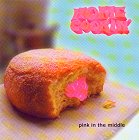 The second entry from Las Vegas-based funk/R&B group Home Cookin’ shows a group that is evolving rapidly. Home Cookin’ still pays tribute to the rhythm-and-bluesier side of 70s disco – think James Brown backed by a big horn section – but there’s also a growing acceptance of some slightly more modern sounds, a couple of samples and some electronic percussion (primarily heard in “City Of Sin” and the “X-Rated Superstar” remix).
The second entry from Las Vegas-based funk/R&B group Home Cookin’ shows a group that is evolving rapidly. Home Cookin’ still pays tribute to the rhythm-and-bluesier side of 70s disco – think James Brown backed by a big horn section – but there’s also a growing acceptance of some slightly more modern sounds, a couple of samples and some electronic percussion (primarily heard in “City Of Sin” and the “X-Rated Superstar” remix).
The dozen tracks on Pink In The Middle are a strong offering. The band has a little more self-assurance both lyrically and musically, and the songs are more varied in tempo and arrangement. The first Home Cookin’ album featured some stretches of two or three songs where it was difficult to separate the songs. No such problem with Pink In The Middle. The new album spans several styles of funk and ’70s R&B, and even manages to make them sound fresh.
My favorite track from Pink In The Middle is the heavy-hitting, modern-funk-classic-in-the- making “City Of Sin”, a tribute to the dark, seamy and seductive underbelly of Las Vegas. It’s a perfect example of the right song coupled with the right production style (it sounds unlike anything Home Cookin’ has done before), but the rest of the CD isn’t a slouch either.
making “City Of Sin”, a tribute to the dark, seamy and seductive underbelly of Las Vegas. It’s a perfect example of the right song coupled with the right production style (it sounds unlike anything Home Cookin’ has done before), but the rest of the CD isn’t a slouch either.
If you’re looking to bring back the funk, you can’t go wrong with this one!
- Super Cool Sexy (6:08)
- Got Your Back (4:33)
- Leavin’ (5:06)
- Daddy’s Gone (3:54)
- Keep On Movin’ (4:18)
- What’s Your Crime (6:14)
- Cold Cock (4:30)
- City Of Sin (3:31)
- Rump Roast (5:41)
- Pride (3:59)
- Big Wheel (6:34)
- X-Rated Superstar Remix (17:25)
Released by: Fly Records
Release date: 2000
Total running time: 71:59
Alien Nation (TV series soundtrack)
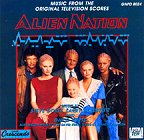 A month or three ago, I remember being a little annoyed at how similar most of the tracks sound on the soundtrack from Earth: Final Conflict. If that show’s producers wanted an example of how to make good, distinct music with an “alien” sound, they should’ve studied this gem from Fox’s critically-acclaimed, fan-adored and prematurely-canned science fiction series which is now a decade old.
A month or three ago, I remember being a little annoyed at how similar most of the tracks sound on the soundtrack from Earth: Final Conflict. If that show’s producers wanted an example of how to make good, distinct music with an “alien” sound, they should’ve studied this gem from Fox’s critically-acclaimed, fan-adored and prematurely-canned science fiction series which is now a decade old.
It’s hard to believe that Matt and George graced our screens some ten years ago, but even so, the music – which was handed off between David Kurtz and the team of Steve Dorff and Larry Herbstritt for alternating episodes – is fresh, alive, and innovative. (The pilot episode, scored by Joe Harnell of V and Incredible Hulk fame, is not represented on this CD.)
Alien Nation did something that virtually no other SF series has done with its musical voice – it made very frequent use of a choral component singing in an alien tongue. No other show has ever come close to approaching this unique sound. A mixed choir gives many of this album’s tracks an otherworldly but organic flavor, swinging the pendulum from almost-Gregorian-chant-like subtlely to the near-religious-revelation of “The Ceremony” (a cue from Three To Tango). In suspenseful moments, the voices suddenly leap out of the background to nail the moment with a primal shriek.
There are a few more traditionally SF cues, such as A”stronomical Discovery” (from the eerie Joe  Menosky-written Contact episode) as well, but the producers of this album wisely made the decision to exploit Alien Nation’s otherworldly sound.
Menosky-written Contact episode) as well, but the producers of this album wisely made the decision to exploit Alien Nation’s otherworldly sound.
And even ten years down the road, this stuff doesn’t sound dated. Not unlike the sorely-missed series which used to feature this music.

- Prologue and Main Title (1:43)
- Generation To Generation (0:40)
- Return To Tencton (3:54)
- One Hot Heinrick (0:52)
- Tenctonolian Mode Groove (1:39)
- Astronomical Discovery (1:14)
- Tailing A Wimp (0:43)
- Howdy, Pod (4:03)
- Alien Animal Activists (1:31)
- A New Beginning (2:28)
- In Your Life (2:25)
- Confrontation (0:53)
- The Monastery Three (1:05)
- George Entertains (1:12)
- The Ceremony (1:39)
- Touch Heads (1:25)
- Presents (1:32)
- George Warms Up (3:08)
- Resolution (1:07)
- Slag Pop (0:55)
- Spaced-Out Lover (1:37)
- Sneak Attack (1:05)
- Jenny’s Story (1:32)
- Sensuality (0:53)
- Cathy’s Story (2:35)
- The Alley (1:12)
- Memory Of An Old Game (2:16)
- George Gets It (0:47)
- Susan: Assassin (2:27)
- Proud Fathers (2:20)
- Prologue and Main Title reprise (1:43)
Released by: GNP Crescendo
Release date: 1990
Total running time: 53:11
Jars Of Clay – Much Afraid
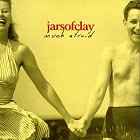 In an excellent follow-up to their debut album, Jars of Clay continue exploring their musical strengths, while moving their lyrics into a more mature and somewhere darker plane. The cutting “Crazy Times”, though it remains within the parameters of the band’s Christian rock obligations, also seems to be a little more judgemental than the first album’s material (“it takes more than your saline eyes / to make things right”). However, these lyrics add just a dash of realism to what could have instead been an increasingly happy and condescending tone that I sometimes find irritating in this particular genre. Jars of
In an excellent follow-up to their debut album, Jars of Clay continue exploring their musical strengths, while moving their lyrics into a more mature and somewhere darker plane. The cutting “Crazy Times”, though it remains within the parameters of the band’s Christian rock obligations, also seems to be a little more judgemental than the first album’s material (“it takes more than your saline eyes / to make things right”). However, these lyrics add just a dash of realism to what could have instead been an increasingly happy and condescending tone that I sometimes find irritating in this particular genre. Jars of  Clay maintain their awesome gift for harmonies with songs such as “Fade To Grey”, “Overjoyed”, and “Truce”, my favorites from this album. The string section embellishments from their previous album can be heard again here, proving that this is one band that can find new approaches within the sound that made them popular. Definitely a good one.
Clay maintain their awesome gift for harmonies with songs such as “Fade To Grey”, “Overjoyed”, and “Truce”, my favorites from this album. The string section embellishments from their previous album can be heard again here, proving that this is one band that can find new approaches within the sound that made them popular. Definitely a good one.
- Overjoyed (2:59)
- Fade To Grey (3:34)
- Tea and Sympathy (4:52)
- Crazy Times (3:34)
- Frail (6:37)
- Five Candles (You Were There) (3:48)
- Weighed Down (3:39)
- Portrait of an Apology (5:42)
- Truce (3:11)
- Much Afraid (3:52)
- Hymn (3:56)
Released by: Essential
Release date: 1997
Total running time: 46:08
Bill Mumy – In The Current
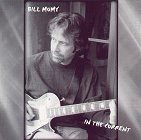 Another musical outing for a former member of the Babylon 5 cast, In The Current is Bill Mumy’s second album on Renaissance Records, and it demonstrates his incredible versatility. From the folky alternative rock style of Angel’s Observation to the gentle, well-harmonized balled “The Climb” (evoking memories of some of the best Crosby Stills & Nash tunes), Mumy covers a lot of ground. Able to go acoustic or electric from song to song, Mumy kicks off the album with the Dylanesque “Lost In Babylon” – a B5 reference in title only. (For overt Babylon 5 references, check out “Stronger Than Gravity”, which is subtitled in the lyric booklet as “To Delenn from Lennier.”) There’s even a slightly suggestive love song in “We Could Use A Little Something”. Mumy skips around different genres like he’d walk from one room to another – and yet most of the time (though not always) he manages to evade many of the clichès we’ve come to associate with the various styles.
Another musical outing for a former member of the Babylon 5 cast, In The Current is Bill Mumy’s second album on Renaissance Records, and it demonstrates his incredible versatility. From the folky alternative rock style of Angel’s Observation to the gentle, well-harmonized balled “The Climb” (evoking memories of some of the best Crosby Stills & Nash tunes), Mumy covers a lot of ground. Able to go acoustic or electric from song to song, Mumy kicks off the album with the Dylanesque “Lost In Babylon” – a B5 reference in title only. (For overt Babylon 5 references, check out “Stronger Than Gravity”, which is subtitled in the lyric booklet as “To Delenn from Lennier.”) There’s even a slightly suggestive love song in “We Could Use A Little Something”. Mumy skips around different genres like he’d walk from one room to another – and yet most of the time (though not always) he manages to evade many of the clichès we’ve come to associate with the various styles.
 Bill Mumy’s not going to wind up on a Golden Throats album anytime soon. This is one actor who is a serious musical contender (and it’s worth noting that Mumy was the musical backbone of the Be Five project which was reviewed here last month).
Bill Mumy’s not going to wind up on a Golden Throats album anytime soon. This is one actor who is a serious musical contender (and it’s worth noting that Mumy was the musical backbone of the Be Five project which was reviewed here last month).
For anyone who’s a B5 fan, a fan of good music that isn’t being played to death on the radio, or a fan of Bill Mumy in particular, my highest recommendations go to In The Current.
- Main Title (3:39)
- Lost In Babylon (4:25)
- Angel’s Observation (Just Like The Other Ones) (4:41)
- I’ll Walk The Walk (3:23)
- The Climb (4:20)
- We Could Use A Little Something (3:53)
- In The Current (3:00)
- It’s Not The Same (2:53)
- Needed To Let You Know (4:21)
- How I Loved My Girlfriend (3:47)
- Stronger Than Gravity (To Delenn From Lennier) (4:34)
- Can’t Win This Game (Bound To Die) (3:10)
- I Don’t Know You (The Wheel Of Faith) (5:09)
- Halfway Home
- To Nicolette (1:32)
Released by: Renaissance
Release date: 1999
Total running time: 52:53
Tim Finn – Steel City
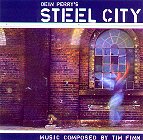 This hard-to-track-down title (at least as far as listeners in the U.S. are concerned) is the studio recording of an Aussie stage musical of the same name. And like the Alan Parsons Project’s studio recording from Freudiana, this version of the music from Steel City – which is often described as a Tap Dogs-style dance-heavy slice of theater – probably differs wildly from what the same material sounds like on stage.
This hard-to-track-down title (at least as far as listeners in the U.S. are concerned) is the studio recording of an Aussie stage musical of the same name. And like the Alan Parsons Project’s studio recording from Freudiana, this version of the music from Steel City – which is often described as a Tap Dogs-style dance-heavy slice of theater – probably differs wildly from what the same material sounds like on stage.
The music for Steel City was composed by Tim Finn, whose solo career is often unjustly overlooked by constant reminders that he was once the lead man of Split Enz and a one-time member of Crowded House. Though Finn’s involvement in the music was the beginning of my interest in Steel City, it was not the only reason I was interested in hearing it. For I have a mind-bending secret, a deep and abiding love for a medium you probably wouldn’t expect me to care for at all.
I like tap dancing. Not that it’s something I do on the bathroom linoleum while no one’s looking – I’m carrying around probably 80 pounds more than I should for that kind of activity – but I love the sound of it, and the whole old-fashioned millieu that it invokes. And I’m no purist – I can handle the new-style tap (i.e. Stomp! Out Loud, Tap Dogs, etc.) just fine…I love it, in fact. I’m not a big fan of the whole Riverdance thing, but that’s because it was quite simply overexposed far too quickly. But I digress. In case I’ve lost you, and it’s entirely probable that I have, the point here is that I really dig tap dancing.
Some hardcore Finn fans may be disappointed that Tim has only a handful of vocal contributions to the album, but I was actually expecting that. Steel City is not a Tim Finn solo project, but rather a musical to which he contributed. If anything, I’m a little more disappointed with the lack of actual tap dancing on the soundtrack. The CD seems to feature the backing tracks…and no actual dancing. I expected Tim himself to make only fleeting vocal contributions, but for a show whose whole point is tap dancing, I felt more than just a little betrayed by the almost complete lack of the sound of taps on a smooth solid surface.
Tim’s handful of songs are quite nice – “Steel City” and “Where I Live” ranking as my favorites. Other vocal tracks include “Glide”, “Rock & Roll Girl”, and – surprisingly – a somewhat unplugged, acoustic version of “Roadtrip”, a song which resurfaced on his new album Say It Is So in a vastly modernized form (though this version is at least as good). Some of the better instrumental tracks are “Overture”, “Absail”, “Truss Dance”, and “Finale”.
 Overall, Steel City is a curiosity for die-hard Finnatics, but for those of you who, like myself, like to hear the feet hit the floor, it comes up a bit short on the tap dancing side. A great pity – I rather relished the thought of one of my favorite voices alongside a really good dance troupe.
Overall, Steel City is a curiosity for die-hard Finnatics, but for those of you who, like myself, like to hear the feet hit the floor, it comes up a bit short on the tap dancing side. A great pity – I rather relished the thought of one of my favorite voices alongside a really good dance troupe.
- Steel City (3:16)
- Overture (2:20)
- Truss Dance (5:43)
- Spirit Level (2:54)
- Old Car (3:40)
- Drop Out (4:57)
- Walking (3:57)
- Smoke Duet (3:14)
- Rock & Roll Girl (3:05)
- Absail (3:23)
- Forklifts (3:26)
- Where I Live (3:50)
- New Car (4:53)
- Road Trip (2:53)
- Finale (5:46)
- Glide (3:18)
Released by: Columbia Records Australia
Release date: 1998
Total running time: 60:42
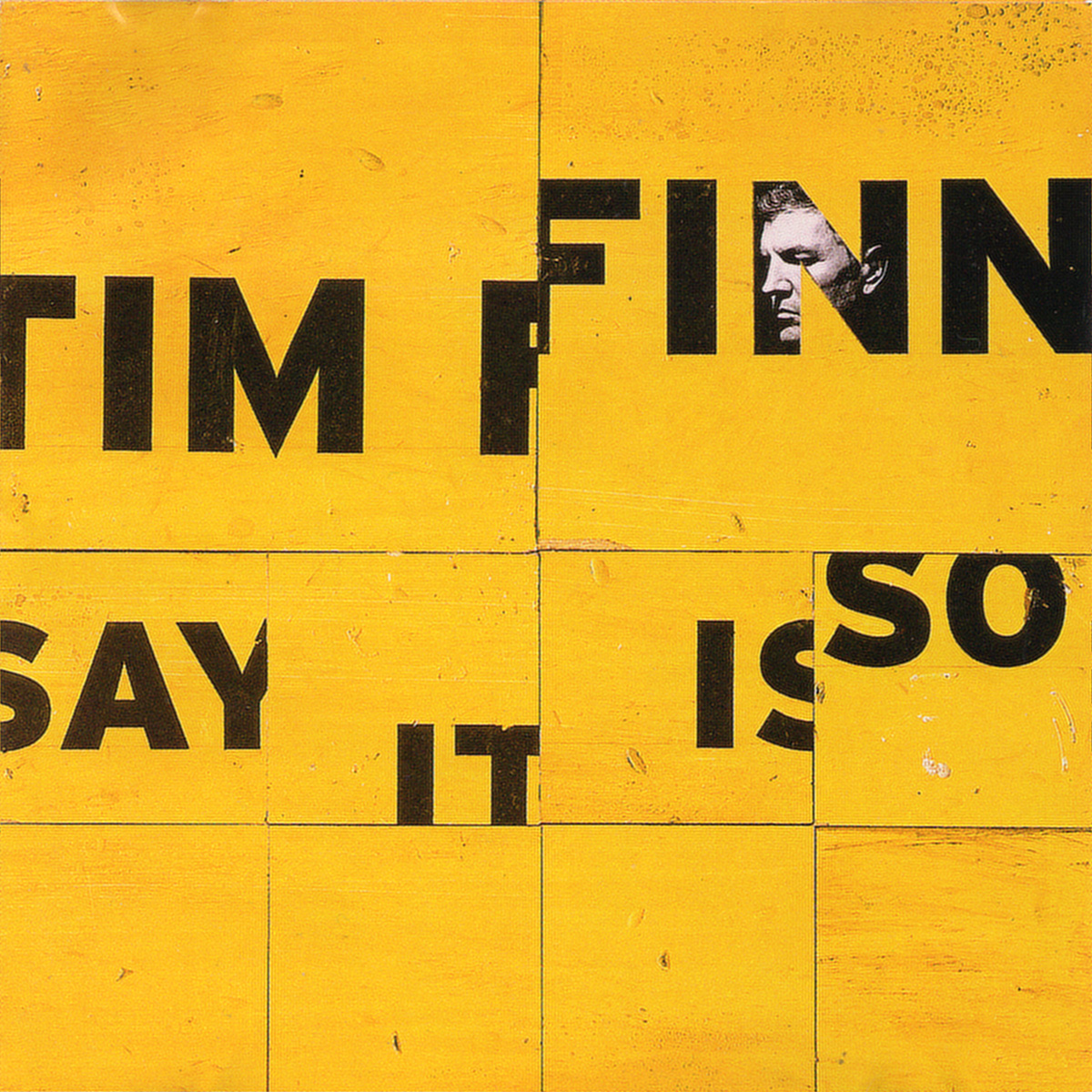
Tim Finn – Say It Is So
 For his first non-soundtrack, non-Finn Brothers-related release in seven years, Tim Finn’s new album Say It Is So has received surprisingly small-scale distribution through a small indie label – a far cry from 1993’s criminally underpromoted Before & After, which was released on Capitol to little fanfare or critical acclaim. The new album, Tim’s first since getting married in 1998 and having his first child, is about as different from Before & After as brother Neil Finn’s first solo album was from anything Crowded House had done.
For his first non-soundtrack, non-Finn Brothers-related release in seven years, Tim Finn’s new album Say It Is So has received surprisingly small-scale distribution through a small indie label – a far cry from 1993’s criminally underpromoted Before & After, which was released on Capitol to little fanfare or critical acclaim. The new album, Tim’s first since getting married in 1998 and having his first child, is about as different from Before & After as brother Neil Finn’s first solo album was from anything Crowded House had done.
The CD kicks off with a pleasantly Beatles/ELO-ish effort called “Underwater Mountain”, complete with string backing. Things quickly get a little stranger with “Shiver”, one of several songs which seem to be trying to drag Tim’s sound into a dub/trance/house-inspired style, with varying degrees of success. Arguably, the best of these experiments is “Big Wave Rider”, where effects and filters are piled high onto the voices about as thickly as possible. With repeated listening, I’ve actually gotten to like “Big Wave Rider” better than anything else on the album! It’s rather infectiously catchy.
When not trying to modernize his sound, Tim’s music ranges from pleasant to puzzling. Pleasant, in the form of the first single, “Twinkle”, which is easily the most commercial song on the CD, and possibly the best; and puzzling, as in “Good Together”, a nice song with perfectly good lyrics which receives an odd vocal treatment, somewhere between Rod Stewart’s early “Maggie May”-era style and a teenage boy colliding head-on with puberty. Tim reportedly used first takes for most of the album’s tracks, which is an interesting experiment, but the vocal styling on “Good Together” is just enough to make the whole song sound just a little bit off, though its rough heartfelt charm is more than enough to salvage it. The thrashing anguish of “Need To Be Right” is also a highlight. The deceptively relaxing “Death Of A Popular Song” has some rather amusing lyrics, some of Tim’s best in years. Several of the songs’ lyrics on Say It Is So were written by Tim’s new wife Marie, and I have to say that, as with all of Tim’s musical collaborations with family in the past, she does bring something to the table from a lyrical standpoint. Then again, I also liked most of the songs on Big Canoe, where the lyrics were written by someone other than Tim, a move he himself later regretted.
For the first time in many years – since his first solo effort, 1983’s Escapade – Tim’s Split Enz cohorts and his brother Neil do not make even the smallest appearance on the album. (This may have more to do with the fact that the sessions were in Nashville than any family politics.)
Say It Is So is, overall, another good collection from one of the founding fathers of Split Enz, even if a couple of tracks are rough around the edges.

- Underwater Mountain (3:56)
- Shiver (4:21)
- Good Together (3:15)
- Roadtrip (3:25)
- Need To Be Right (4:32)
- Twinkle (3:30)
- Big Wave Rider (3:20)
- Death of a Popular Song (4:23)
- Some Dumb Reason (3:03)
- Rest (4:39)
Released by: Sonny’s Pop
Release date: 2000
Total running time: 42:21
